#It's not in fact it's actually against like the whole founding idea of feminism
Explore tagged Tumblr posts
Text
You're making a lot of flaws in this argument that doesn't reflect reality while painting broad strokes to vilify transmasc people— oh, sorry, "maladaptive tmasc spaces," conveniently tagging #transandrophobia so you really mean transmasculine folk who talk about how transphobia affects them. Because acknowledging the oppression they face is "maladaptive."
my theory about this which is very constrained by my personal aka white experience is that one of the things that happens to u as a white baby girl and then as a young white woman…
Here's the major problem: you're coming from a white POV presuming everyone you're talking about is white. They're not. For instance, I'm a Black trans man. Many of the people this website has vilified, who founded and contributed to transandrophobia theory, are Black, Asian, Latine, indigenous, or Jewish transmascs and nonbinary folks speaking from their own experiences or the experiences of others. The harassment campaign against them relies on whitewashing these users to make their arguments and perspectives seem much more shallow than they actually are, as if they're not founded on these folks' racialized experiences within a racist patriarchal system.
And even if the majority of these people were white, that doesn't automatically invalidate their ideas. A lot of founding tenets of disability theory were made by white scholars. Does that void every concept within critical disability theory, whether disabled people of color contributed to them or not (which they have btw)? Absolutely not.
Also, stop sticking "white" in front of a group of people you're bigoted against to make it seem okay. "White women," "white gays," "white aces," "white trans men," "white theyfabs" — majority of time I've seen these phrases, it's not to call out racism but to appropriate antiracist rhetoric to be to misogynistic, homophobic, aphobia, and, dare I say, transandrophobic.
**Not to say there isn't anything to criticize about white women and white gay people, but I've seen many go on the say some horrendously sexist and homophobic stuff by tacking "white" in front then go on to be sexist to Black women and homophobic to Black gay people, because they're not really talking about white people.
if ur going to be aware of ur own misery and oppression under patriarchy u have to like develop these repetitive cycles of validation of your own oppression and internal experience as Real and Valid. because everything is very invested in making you forget. and then this cycle can continue when u transition: the overwhelming majority of bad reactions to transmasc people are based upon that previous reaction to girlness which is to infantilize u and dismiss you and treat u like u arent real. and so as a continued reaction to this many tmasc people become singlemindedly focused upon Realness and Validity. Realness becomes the Only Real Problem, the one Great Wound to be healed.
Fun fact: transphobes see us as girls, so they infantilize and dismiss us. Which is what you're doing here by trying to intellectualize and assume what our thought processes are to make our actions seem frivolous.
You're using a presumed proximity to "girlness" to repudiate transmasculine people — that we act like girls, react to oppression like girls, are "maladaptive" like girls with "extreme disproportionate reactions."
First off, girls and women don't all act the same. That's basic feminism 101. Some similarities exist, but the entire group doesn't share those traits.
Secondly, you're assuming all transmascs maintain their "socialized female" behaviors. Again, many don't. Some do, but it's unlikely that everyone in this whole group of trans men and nonbinary folk you're referring to. There's also many who knew they were transgender young, transitioned young, and had a boyhood, not a girlhood. For those who realized they were trans later, they may not pick up "girl" thought patterns and behaviors, so they didn't even have a typical girlhood, especially not a "white girlhood." I certainly didn't.
You keep using the word “obsession” as to dismiss anyone who talks about transandrophobia as a concept or reflects on it upon themself — they're not serious, they're like obsessed girls. You keep using the word "validity" as if to argue this is only what transandrophobia is about to make it seem as a "terminally online" thing — they don't care about real problems, they just want to be validated at the adults table.
It's a sign you're not really paying attention what many in the #transandrophobia tag are talking about or even transmascs outside of tumblr. Reproductive justice, accessing gynecological care and domestic violence resources, corrective rape, misinformation about bottom surgery, police brutality, and ableism used to strip away bodily autonomy are all serious issues falling under transandrophobia that many transmascs are vocal about and actively counteracting.
I'm not gonna deny that many are discussing the validity of transandrophobia, mostly because many are on the defensive from folk attacking the validity of their experiences, their identities, and their ideas. It is reasonable to fight back with counterarguments and affirmations against this offensive.
then they lash out with an extreme disproportionate reaction with the specific aim of invalidating or appropriating the other party's experience of oppression
You can't "appropriate" oppression you yourself experience. I can't "appropriate" my medical abuse. I can't "appropriate" the rape threats I received. I can't "appropriate" my dad kicking me out the house for being transgender. I can't "appropriate" the restrictions around my testosterone.
And much of the "invalidating" coming from this side is criticism against terms that divide the queer community. "TME/TMA" has been repeatedly called out for exorsexism and intersexism inherent in the dynamic as well as how the terms are largely used to vilify trans men, not discuss transmisogyny. "Misdirected trans/misogyny" is literally only used to tell trans men they don't have unique experiences under transphobic marginalization. “Theyfab” is literally a slur.
they start literally viewing transmisogyny as a privilege
No one is doing this.
an over-focusing on Validity can create situations where people can become incapable of actually recognizing the severity of other people's non-validity-related experiences of pain and suffering.
Again, this isn't happening. Talking about oneself in one's own circles or when invited to in other circles does not mean one dismisses or minimizes the experiences of others. Just because you don't have the mic for a minute doesn't mean the person with it doesn't give a shit about you. In fact, many of the trans men who discuss transandrophobia also discuss transmisogyny, exorsexism, and intersexism. They frequently invite trans women, nonbinary people, and intersex folk to contribute to the conversation with their own experiences and how that manifests as transphobia at large.
Do they mostly talk about transandrophobia though? Yes, because they're transmasculine. They talk about their experiences in being transmasculine and that's as fine as folk who talk about their experiences in being transfeminine or genderqueer or intersex. They know the limits of their own experiences and don't talk over others.
What does piss me off are people who aren't transmasc who demand to be in a of conversation that isn't about them, assert themselves as all-knowing about the transmasc experience, and demand transmascs shut up.
you DO have privilege over trans women
We don’t. It sucks to be trans whether you’re a trans woman, trans man, nonbinary, or genderqueer because of transphobia. Gender privilege doesn’t exist when you’re transgender. Stealth trans people don't have privilege because upon coming out or being outed, they lose all supposed "benefits" of being presumed cisgender. If your privilege relies on being in the closet, that is not privilege.
The concept of gender privilege relies heavily upon cis feminism, which does not adequately capture the trans experience. It's shortsighted to presume it does.
Fact of the matter is you're apply a lot of assumptions that don't line up with reality to demonize transmascs and perpetuate the discourse that makes this website hostile to them.
my theory about this which is very constrained by my personal aka white experience is that one of the things that happens to u as a white baby girl and then as a young white woman is that bad things are happening to you, and everybody needs to convince you they arent happening (to make sure u are subjugated but still content enough to further the project of white supremacy). and also nothing you think or feel or want can be real or meaningful bc ur just a girl.
and so if ur going to be aware of ur own misery and oppression under patriarchy u have to like develop these repetitive cycles of validation of your own oppression and internal experience as Real and Valid. because everything is very invested in making you forget.
and then this cycle can continue when u transition: the overwhelming majority of bad reactions to transmasc people are based upon that previous reaction to girlness which is to infantilize u and dismiss you and treat u like u arent real. and so as a continued reaction to this many tmasc people become singlemindedly focused upon Realness and Validity. Realness becomes the Only Real Problem, the one Great Wound to be healed.
which to my tfem friends can explain a lot abt the weird way tmasc heavy spaces talk about gender: its a lot of reassuring yourself and others that you're Valid. that youre Real and Valid. youre So Valid. which for most of the tfem people in my life has been kind of bewildering because the truth is if ur tma nobody needs to tell you what youre doing is real because immediately people start doing transmisogyny at you.
514 notes
·
View notes
Text
Girl help a reply I wrote on twitter about TERF ideology got more than 10 likes and now my notifications tab is full of essays on how biological essentialism is feminist actually.
#It's not in fact it's actually against like the whole founding idea of feminism#But go off Jackie from Manchester I'm sure you know better than the sum total of centuries of feminist thought.#Good excuse to take a couple days away from the bird app methinks
7 notes
·
View notes
Note
Hey, I'm new here and i love your blog! I was wondering if the boys see couple\sexual edits of them together and if it makes them nervous but then it hit me that they probably aren't seeing what i see on western social media. Do you have any idea if those types of homosexual posts get censored in China?
Hi Yingyangorly! Thanks, I'm glad you're enjoying my blog!☺️
I have a huge long, like, ridiculously long post in my drafts related to this topic, hopefully coming soon.
But to answer your question, I think it's impossible that GG and DD would fail to see at least some of what's posted about them as a couple, whether sent to them by friends, family or staff, or whether stumbled upon or intentionally sought out/browsed by them. It's inevitable they'll see some of it, particularly things that get a lot of attention.
I talked about this a bit a while back. GG and DD have said in interviews that they have fake social media accounts (and of course they would - how could you go anywhere or do anything on social media without one if you were famous?), and this kind of discussion has happened somewhat in relation to fan comments, etc.
You can check out my previous post for more on that stuff.
As for sexual edits, etc., like any other content I've no doubt they've seen some of it - it's inevitable they would - but I doubt it worries them all that much. It's highly unlikely to ever impact them directly, because ultimately it's not really about them, is it? It's about the creators who make it. Any backlash is more likely to fall upon creators, not GG and DD.
And just as a reminder - it's not illegal to be gay in China, it's not illegal to post homosexual content, etc. Such content is censored on TV and other broadcast media, but not online.
Porn is very illegal in China, but that's mostly only selectively enforced. In fact, China produces a lot of porn and a lot of smutty fiction and all of it is illegal, but it still manages to thrive fairly well.
Explicit content of any kind is technically not allowed on Weibo but it's still out there - although most of it is pretty toned down and tame. Actual porn of sexual activity isn't ubiquitous there, but lewd fan art, fan fic, edits and memes can often be found.
All platforms globally have rules against explicit content, and they're just as poorly enforced everywhere. I suspect a lot of that is because social media engagement makes money, and sex sells. It's not really in the interest of platforms to completely shut down all such content - even if it was possible to do so.
The supertopic rules likely have more impact on fan behavior in this regard than the Weibo TOS does. Those rules forbid mentioning GG and DD by name or tagging their accounts, and forbid sexualization, pornography, feminization and fixating on body parts. However, that's only within the supertopics. Ultimately people are free to post whatever they want on their own accounts, and they do.
Given how many antis and solos are out there trying to take down the turtle fandom, the fact that these things manage to stay up for as long as they do speaks to how weak the enforcement is. There are definitely people out there who will report things that offend them.
This is, in fact, how the whole 227 thing got started. A bunch of solos decided to report an explicit fanfic to the government, and things spiralled out of control from there.
Could lightning strike a second time and another 227 be sparked from some of this explicit content? For a lot of complicated reasons I'm not going to get into here (it would be a very long post), I don't think that's likely.
227 was a special, very complicated situation that I don't think is likely to happen the same way again. Timing and a lot of the other factors that played into its blowing up the way it did - all of that is unlikely to align in such a way. Especially since everyone in C-ent is a lot more cautious and vigilant after 227.
GG and DD are both in good standing with the government (as is evidenced by their inclusion in government and nationalistic projects), and that's a factor that will have some influence. And no doubt they and their teams have learned a lot from past experience, and have already planned for how to protect them in various scenarios that could arise.
They also have the power to have content relating to them removed, to sue content creators, to shut down the supertopics if they want to, etc.. If they feel at risk, they have a lot of recourse. The fact that we aren't seeing this happening should reassure us that it's probably fine.
We have to realize that GG and DD are surrounded by highly skilled, highly paid professionals whose entire job is to protect them and their interests. They're both in a much safer place than they were 4 years ago.
I trust them to know what's best for them and handle their affairs accordingly. We as fans shouldn't waste time hand-wringing over things that are completely outside our control.
As for what's within our control - it's up to every individual to make our own choices about how we'll represent GG and DD online.
More on that angle if/when I ever finish that other post.
57 notes
·
View notes
Text
Barbie: Yeah, I’m a Guy Who Watched the Barbie Movie.
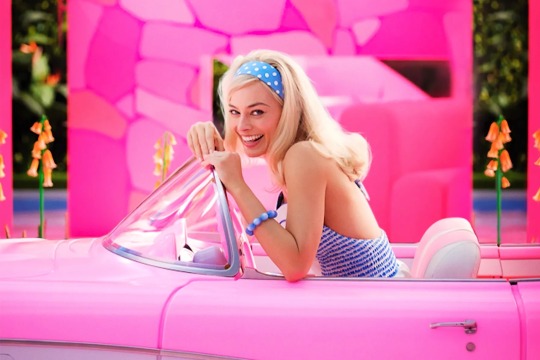
Sooooo... I’ve watched the Barbie movie. And I am a man. So deal with it.
What is the Barbie Movie?
Basically, the Barbie Movie is about... well, Barbie. Everything pink and feminine as far as the eye can see. The movie itself however is taking it in a far different direction.
The film’s director Greta Gerwig is basically a surprising director to have for the film. Gerwig is known for her female-driven movies like Ladybird and Little Women to name a few. So it’s no surprise that Barbie is on a journey of self-discovery about her identity as a woman and a Barbie.
There’s also this whole Barbenheimer meme going on, but I’m talking about Barbie.
After Watching...?
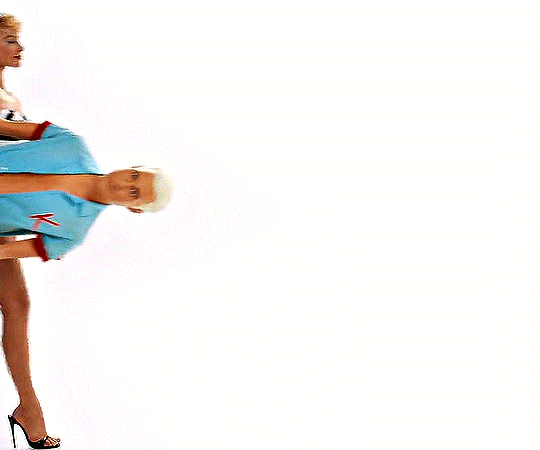
The Barbie Movie is both a jaunty jab at the stereotypes of both male and female roles and Mattel, as well as a beautifully hilarious film thanks to Margot Robbie’s portrayal as the classic or stereotypical Barbie. Robbie’s Barbie goes though a transformation from the definitive Barbie to a fully grown being. Her existence is put into question as she learns more and more about the real world and the harsh truths that come with it. She slowly discovers that she’s more than a Barbie, but an actual person with autonomy and choice.
America Ferrera kills it as a lover of Barbie who had to live with Barbie’s standards in the real world. Ferrera gives a powerful speech about the constant frustrations of what it’s like to be a woman, perfectly encapsulating the highs and lows of the gender in a completely human way. Ferrera is the perfect person to take on this role based on her work from Ugly Betty and Superstore, showing more humanly real traits than superficial perfection.
Ryan Gosling’s Ken as an antagonist made a lot of sense once you think about the theme of film. Ken is essentially the butt of the joke that Barbie takes for granted, making him feel inadequate. So when he finds the respect he craved in the real world, he starts to build a “Kendom” for him and his fellow Kens to feel good about themselves and step out of the shadow of the Barbies. It is exactly how we all think would happen if Ken found out about patriarchy.
It basically tackles both ideas of feminism, patriarchy, hyper femininity, and toxic masculinity in this film without making it too preachy or forced in your face or that men are trash and women are perfect. No, it takes those ideas in a way that addresses the flaws in each set of philosophies while not demonizing or glorifying any side. They’re just opposing ideas with their own problems to deal with and some good ideas that are taken too much as fact without common sense.
The scene that moved me the most was Barbie’s choice to become human after experiencing life and having a conversation with the creator of Barbie Ruth Handler. Combined with the haunting Billie Eilish song “What Was I Made For” and flashes of various girls and women living life, it was a beautiful tribute to what Barbie was initially made for: a tribute to a daughter from a mother.
What Was Barbie Made For?
Barbie was made for those who think Barbie is just a doll that goes against modern women and those who believe Barbie to be an inspiring figure to strive, but most of all those who know the full history of a mother-daughter relationship in its creation.
If you love Barbie, you’ll love the movie. If you hate Barbie, you’ll love the movie. If you don’t know Barbie, you’ll love the movie.
#barbie#margot robbie#ken#ryan gosling#greta gerwig#ladybird#little women#barbie 2023#america ferrera#ruth handler#billie eilish#barbenheimer#barbieedit#ugly betty#superstore
247 notes
·
View notes
Note
I have to say both Consanguinity and Victory stand out for me as usually I can't stand reading A/B/O often all feelings seem...removed? Good or Bad and the hyper feminization of any "omega" often just...makes them nothing like the character they are supposed to be?
In Victory were Luke, for all almost every control is taken from him...he fights back (with help).
In Consanguinity sure Addam especially finds Luke very cute, but at least the (saner) members of houses Targaryen and Velaryon still respect that he is a living breathing person. He also still feels like Luke.
This is rambly but anyways, glad I took a chance of those two after reading Carrion. ^_^
I wrote such a long response to this and Tumblr ate it 😑 Thank you so much for such a lovely comment! I’m so happy that you took a chance on both of those fics and found it worth it. You’ll have to forgive the incoming recreated essay:
I have to admit, I’m not massively fond of some common tropes in A/B/O fic gender dynamics - at least, not when they’re played straight. Considering ASOIAF already features pretty strict gender roles with characters who struggle massively against them, there’s definitely a lot to explore when you introduce A/B/O into the mix!
When I was picking prior Targaryen omegas, Alysanne seemed an obvious choice - not just for the sheer number of children, but the fact that she was so focused on gender roles and improving rights, whilst being married/bonded to a guy who very much fell short in that regard. So the idea of her and Jaehaerys being held up as the Targaryen ideal pair as a bonded alpha/omega in that context was quite interesting.
I did think about Vaegon being an omega for the lol factor, but given Jaehaerys’ treatment of his daughters, I didn’t see him letting Vaegon off with a Citadel career if that had been the case.
And then I chose Visenya for the other, because I quite liked the idea of one of the fiercest, deadliest members of House Targaryen being an omega (you can bet Rhaenyra, Visenya fangirl that she is, helped hype Luke up with stories about how badass omegas could be after he presented), and also because that was quite an intriguing dynamic to me - an omega who could only produce the one child, the multiple bride aspects (I don’t think Aegon ever actually bonded with Visenya) and with Rhaenys being the more traditionally feminine one who Aegon preferred as a beta instead.
So for Luke in both fics, I definitely wanted to write him in a similar way to how I’d write in non-A/B/O fics. The fact that Jace is an alpha in Victory and yet is in a similar situation was quite important; he and Luke empathise with and empower each other, and Luke is very much the ringleader of their whole plan there (fun fact: his expression at the end is very much reminiscent of him smirking at Aemond over the roasted pig in canon).
Even with other characters, my rule of thumb is generally that their personalities should not really shift depending on what I’ve assigned them as but rather on the situations they find themselves in. Aegon III, who is obviously quite withdrawn and traumatised in canon, getting ready to dump wine on Aegon II’s head at the start of Victory because of the treatment of his family despite being a beta is probably a good example.
In Consanguinity, the power dynamics between Luke and Addam - Luke is younger and rides a smaller dragon, but he’s future Lord of the Tides and was massively higher on the social totem pole than Addam until a short time ago - and the fact that Addam is so laidback, makes writing them as a pair quite fun! The bit where Luke admits he’s not sorry for taking Aemond’s eye and Addam finding his feralness pretty appealing was in my mind from the start. You can see hints that here as well the Greens are far more traditionalist in their mindset, which is a definite cause of friction between both sides.
As Joffrey demonstrates, the Blacks very much consider Luke to be every much a fighter and future lord in his own right as his brothers, and if someone objects, they’re very happy to introduce them to their dragons. Which is going to be a pretty important factor for certain characters going forward.
15 notes
·
View notes
Text
Limbus Company Artist Fired Amidst Controversy
I'm not a fan of the whole "'fans' of a game review-bomb said game in response to a disliked change." We've just seen this with Skullgirls: Second Encore, and while on paper, the idea of fans being able to voice their issues with given changes sounds great, it just opens the door to a lot of very bad-faith actors mobbing the developers to harass them more than anything else. There's dialogue, then there's just banging down people's doors, and I think when a studio says, "We will not be answering questions related to the subject; this will not be open to further discussion," it ought to be a sign that your energy is better spent elsewhere. The fans of the Korean gacha RPG Limbus Company lived up to that "lofty" ideal earlier this week following a controversial change.
It all started with recent changes to the game, including new upgrade tiers; the implementation was pretty shaky, with fans displeased at how many resources it took to upgrade characters to the new tier, secretly nerfed upgrade benefits to stats, and certain characters being bugged upon being upgraded to the new tier. So far, yeah, I'd be very upset about that too. After all, it's evident that gacha games are all about the grind, but you at least want to ensure that the upgrades you're grinding for are worthwhile or, y'know, work.
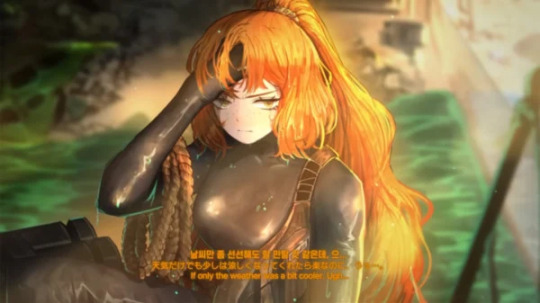
The real trouble starts with the Limbus Company summer event that started this month. Being summer, the game had an ocean-themed event, but fans in Korea were displeased with... the character Ishmael drawn in a wetsuit instead of a bikini. And, sure, I look forward to summer events too—I'm not gonna pretend I haven't spent hours in Action Taimanin grinding up for Emily Simmons' swimsuit. But fans were specifically upset over there not being a sexy swimsuit for Ishmael at all. Like, really upset. So much so that they were ready to aim their complaints at the artist who drew Ishmael in the wetsuit, claiming that "radical feminism had taken over the studio." The fans changed their tune when they realized that the artist who had drawn the art was a man, so they instead targeted VellMori, a female artist who worked with the studio. Digging up some of VellMori's old tweets, they found her voicing such "radical" ideas as... how you probably shouldn't take candid photos of women in public. Fans also congregated on websites in an attempt at whipping up further libel against VellMori, such as claiming that she was also secretly a trans-exclusionary radical feminist or secretly in favor of sexualizing minors. This led to more fans congregating around the offices of Limbus Company's studio in protest. Eventually, the studio fired VellMori.
The whole incident reminds me of the case with Allison Rapp a few years back. For folks who don't remember, Allison Rapp was an employee at Nintendo of America who worked in marketing. Following the controversial localization of Fire Emblem: Fate, fans... somehow decided that Rapp was to blame for the changes, even though Rapp worked in marketing (fun fact: she was also product marketing lead for Bayonetta 2, so we have Rapp to thank for Pamela Horton's famous Bayonetta 2cosplay in Playboy Magazine. Harassers dug up plenty on Rapp, including a thesis that she had later redacted. Honestly, this sucks, and considering the outrage some had towards Skullgirls: Second Encore a few weeks back, it's a relief to know that nobody at Future Club had that kind of vitriol aimed at them. Internet harassment toward developers is something that I don't think a lot of studios know how to handle, and the means of communication gets manipulated by many bad-faith actors.
This situation sucks, top to bottom, and I hope that VellMori can find a better job somewhere else, hopefully somewhere that supports her. I hate that this story keeps happening in the game industry. Please don't make me have to write about it again.
4 notes
·
View notes
Text
Including Men In Sex Positivity: We Can’t Expect Men To Fix Other Men’s Behavior Before Including Them
I was all excited because I found this fairly recent article online talking about how there is a need to include men in sex positivity, and then I read the whole article and pretty much all the author is calling for is for men to listen to women more and to intervene more with other men doing bad things to women.
And I’m like, dude. I don’t think you get it.
Like, if you live as a man, you can listen to women all you want, you can take women’s studies in college, be a raging feminist, pour countless hours in feminist movements and activism, and this will do little to nothing to tear down your internal shame and guilt associated with sex. And in many cases, it might even make it worse if you are listening to the (numerous) women who are ranting about the horrible things men have done to them and have taken it to generalizing negatively about men and/or talking about men as if their sexuality is inherently threatening or inherently bad. Many women are trauma survivors and trauma survivors don’t always exhibit fully rational thinking, as I can testify as I have my own trauma and have struggled with irrationally demonizing people (including men) in the past too.
The men who need to listen to women more are not going to have much overlap with the men who are reading an article on the need for sex positivity for men, written by a woman, on a feminist website.
And then the article starts going into how, after listening to women, men can move things forward by using their male privilege to influence other men, blah blah blah.
I’m really sick of the attitude that all men are responsible for the bad behavior of other men and the idea that feminism is going to move forward by the men who are already engaged in it, doing more to engage other men. There’s a huge assumption in here, which is that all men necessarily have power over other men. In many cases, they simply don’t have this power at all, and in the few cases where they do, it is limited and highly situational.
I have a story about this. When I was in middle school, there was a (heteronormative) exercise we were given in home economics class, in which they divided the class into girls and boys and had us, in groups, list what qualities we found attractive in the opposite sex. I was put in the boys group. The group was dominated by a small group of kids who were loud and a few of whom would actively bully me. Really quickly they started writing down objectifying stuff that I didn’t relate to. I knew that if I spoke up, I would just get bullied and shut down. So I was quiet, and the group drew up and presented a list of really objectifying, misogynistic things that did not at all reflect what I (or even what the majority of the people in our group) actually believed.
The teacher, who to her credit was pretty aware of the social dynamic, realized what had happened and then kinda publicly shamed the boys who had written the list, and then excluded those boys and asked the rest of us to come up with our own list after-the-fact. Interestingly, the list we came up with was not at all misogynistic and focused on personality and behaviors rather than appearance.
But what is the lesson here? The solution wasn’t for boys to police boys. Boys policing boys had been failing for months because the culture was persisting on its own. The solution was for an authority figure to step in and prevent a small subset of more aggressive boys from dominating the conversation. And in this instance, the authority figure happened to be a woman, proving that it doesn’t have to be men who take action. The person’s gender wasn’t even important, the key was that the person had the power and authority to shut down the boys whose behavior was problematic.
Out in the real world, black men and other BIPOC men often aren’t in a position to speak up against white men who are engaging in misogynistic behaviors, especially in racist settings. Why? Because they don’t have power and authority. If they tried to speak up, they might even be subjected to violence. The same is true of queer men and GNC men as they are often less likely to be taken seriously and more likely to be subjected to derision or violence. Neurodivergent men also have a really hard time. They might misread a situation in the first place and make a fool out of themselves, and they might feel afraid of getting involved even if they think something is bad, because of past experiences with humiliation after they misread a situation (I know I struggled with this a lot when younger.) And they might not say or do the “right things” and they might end up targeted in a situation where they try to help. And socioeconomic status is a factor too. Men of high social status and wealth can get away with behaviors that a lot of people couldn’t and people of low status certainly couldn’t. Just look at all the examples of some rich white college student sexually assaulting someone at a frat party and getting away with it because his dad has connections. People of high status are often able to get off the hook for crimes through lawyers and connections, whereas in an altercation, people of low status are more likely to end up getting charged with a crime, convicted, and put in jaiil.
So...look at how this topic had gotten derailed. I started by searching for information about how to include men in sex positivity, and now I’m talking about how men are expected to police other men but in reality, they’re usually powerless to do so.
This is a serious problem in feminism, and I have news for you. For once, the problem here isn’t men. It’s women (and some men and others who join and support their voices) who are failing at intersectionality, blaming all men for a problem that is really limited to a specific subset of men, and expecting men who have no real power to do anything about these men, to do something.
It’s time for us to include men in sex positivity. And including men does not mean that we insist that men stop other men who are engaging in bad behaviors before they get included and supported. Including men does not mean insisting on men listen to women say the same things over and over again before their own voice gets included and heard.
If we don’t change our approach, this issue is never going to progress. We need to include men in the sex positive movement now. And we need to include these men with an understanding that they are responsible for their own actions, but not the actions of other men. We need to stop assuming that men all have inherent power over other men. And we need to start examining the racism, classism, ableism, and other bigoted assumptions in the expectation of men to solve all these problems themselves. And we also need to start examining the ways some self-identified “feminists” talk about men and male sexuality that is deliberately excluding them from sex positivity and from feminism in general, i.e. talking about men as if they are inherenetly bad and specifically talking about male sexuality and male attraction to women as if it were inherently predatory, and how this idea not only excludes men from sex positivity and feminism, but it also lets men off the hook when they engage in bad behavior, and wrongly targets the men who do not engage in these behaviors.
Yeah.
78 notes
·
View notes
Text
Hordak can’t catch a break even on his birthday...
Oh fandom, you really like this sort of drama don’t you?
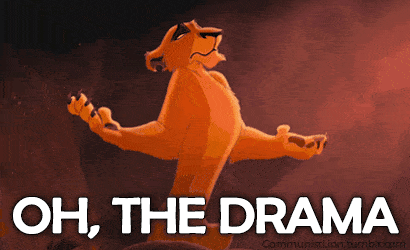
A few days ago, on Hordak’s birthday, there was this ‘interesting’ post in the tag – since, apparently it’s impossible to get any peace even on that day.
I was too tired to answer it at the time after being on call the day before so, here’s my delayed answer to all of that:
First off: this post has this bit in it when asked what that person dislikes about SPOP.
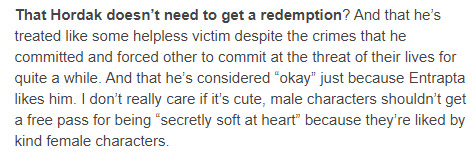
He doesn’t need to get a redemption and he doesn’t get one in the show.
None of his actions constitute a redemption arc. The man merely acknowledged his personhood and freed himself from his master and God. That’s what his arc was about: the right to have a personal identity.
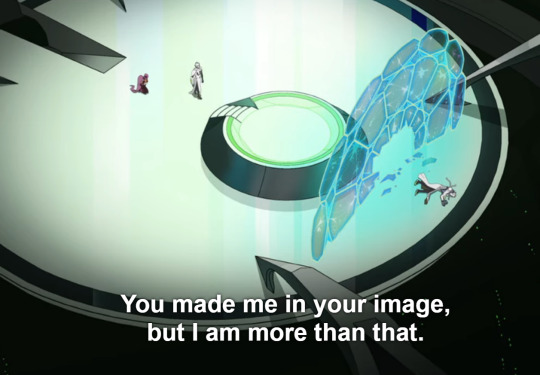
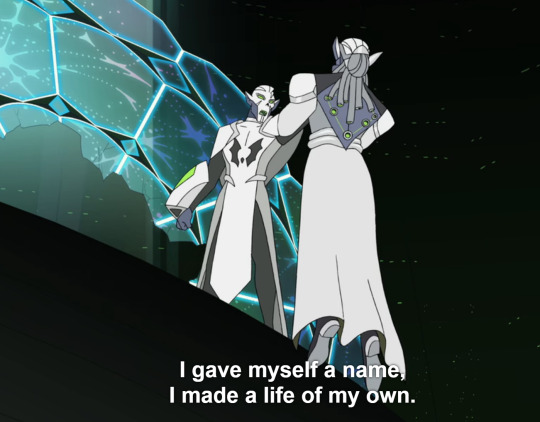
He gave himself a name and wanted to be his own person. That’s it. That’s all he wanted.
The man was merely freed from Prime’s influence- an influence he was born into since he’s been specifically manufactured to serve as a disposable mass produced soldier and worshipper of Prime.
If the argument that Catra was “forced” to commit crimes and thus she is not completely guilty of them since she was under duress – then the argument doubly holds for a person who has been directly programmed and conditioned to do so under the threat of death or mental rape (purification).\
Even while away from Prime, he was still conditioned to obey and brainwashed by Prime’s cult. He literally knew nothing else – he was not meant to. It’s how indoctrination works.
Prime’s clones aren’t people to Prime, they are tools. Those clones, while cut off from Prime still want to serve and please him: That’s what Wrong Hordak’s purpose in the show is- to show us just that.
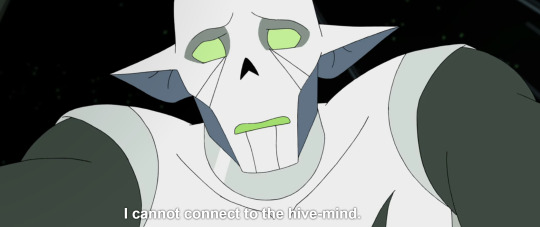
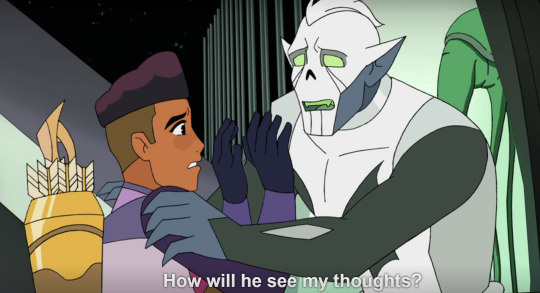
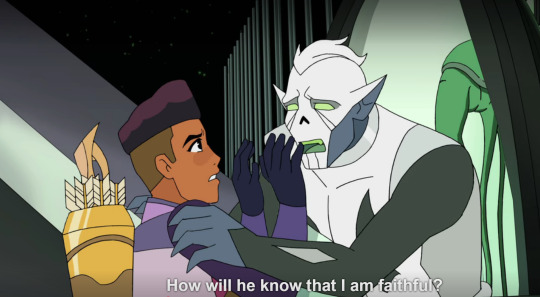
Hordak is not considered “OK” because Entrapta likes him. Hordak is merely shown – by Entrapta that he could live apart from his cult and have worth outside what Prime tells him he has.
Just like real life cult victims, he needs an outsider to help him see a way out of the cult. The nature of indoctrination and brainwashing makes it impossible for the brainwashed person to know they are brainwashed unless someone points it out.
Now for my favorite thing:

and

oh and

Oh boy… this makes me just so damn uncomfortable.
To offer a bit of context as to why. I have never been on social media before SPOP or in any fandom and as such, I have never encountered the ‘all men are evil’ discourse that seems to infest these places. It’s been quite a bit of culture shock for me.
What is it that makes anyone think it is ok to judge a person because of an accident of birth? (being born male)
Why does hate for 50% of the human population get such a free pass on these platforms? Misandry is just as terrible as misogyny. You are being biased against another human because of their gender. I don’t care that males are perceived as ‘privileged’ – that doesn’t make it ok to be terrible to them unprovoked.
How does hating all men help achieve equity?
Do you realize that this sort of discourse is exactly how you radicalize people against the very cause you are championing? You breed hate and adversity for the rest of us who actually want to to have a discussion on the topic.
I’m a feminist myself (in a country where feminism is hard-work) and let me tell you, making all men hate us does nothing but push away potential allies and make it a lot harder for our voices to be heard.
Feminism is about equality, not women dominating.
Now onto the second post: the one comparing Catra and Hordak with the question of which of them is a better person.

This whole war orphans that were personally abducted and tortured into serving the horde HC that some ppl have is really starting to get boorish. This has been going on for more than 6 months.
I have no idea why everyone thinks he went down chimneys and stealing babies left and right while cackling villainously. The man had a busy schedule of brooding in his lab, wallowing at his inability to use insulated cables and having his device blowing up in his face with the occasional Skype call to Shadow Weaver to see what the Horde is doing.
And yet, to a part of the fandom, this is what he looked like:
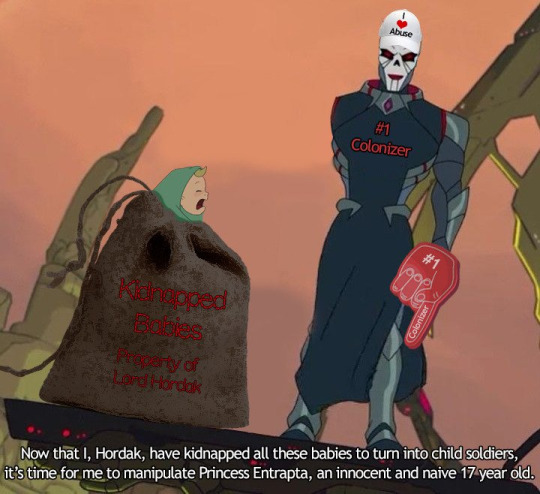
( @bat-burrito made this one and it’s glorious)
And if you don’t believe me about the lab recluse thing, you don’t have to, the show pretty much states it for me.
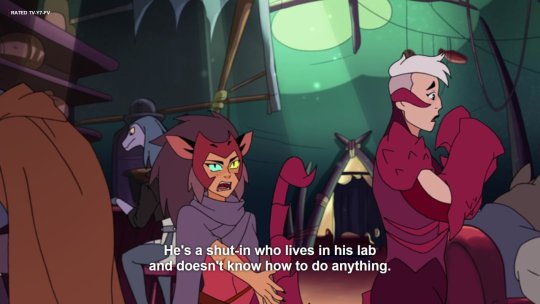
and
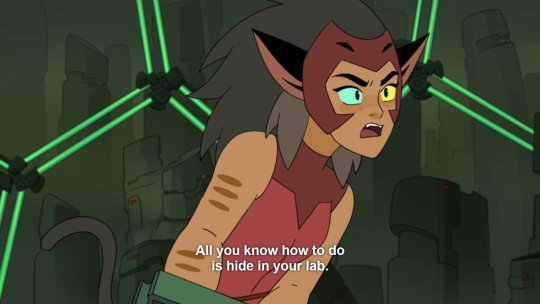
+
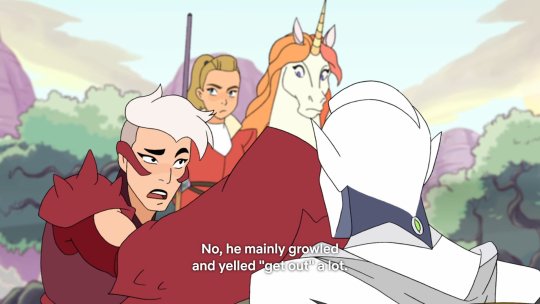
Hordak is a recluse that stayed in his lab and let the running of the Horde and most operations to Shadow Weaver and later Catra. He did not personally abuse anyone and he is not the origin of the cycle of abuse.
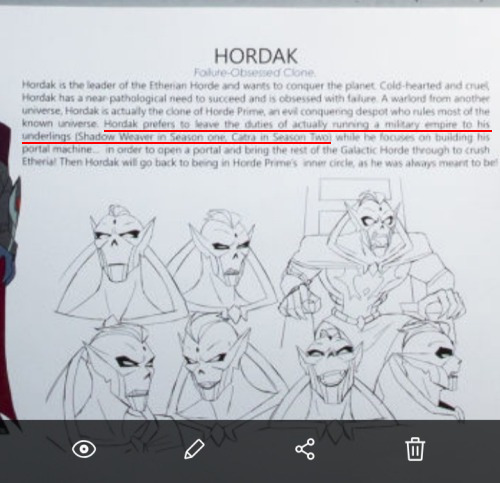
Shadow Weaver was a child grooming manipulative woman before she even joined the Horde – she did this to Micah while she was not “evil” or presumably abused by Hordak.
Even if you want to HC that Hordak abused her somehow, he is still not the one who started the cycle: Horde Prime is.
The whole fandom seems to forget about the eldritch monstrosity that created a whole army of brainwashed slaves to worship and die for him. Prime is the one that sent Hordak to die and gave him the motivation to try to prove himself worthy of life and love. If you want to point fingers, point them at the origin of all of this. This fandom has a strange Prime blindness. He is never talked about when it comes to being the start of all of this.
If Prime didn’t exist, Hordak wouldn’t exist. If Prime hadn’t sent Hordak off to die, then his clone wouldn’t have accidentally ended up on Etheria. None of the things in the show would have happened.
Adora would have died of exposure in a field, the monarchies on Etheria would have continued as they are and the planet would have continued to exist in despondos.

He is a dictator, yes. So are the princesses. Monarchies are dictatorships where the ruler is born into power. Hordak gained his through military might while Glimmer was born with hers and enforced it with tradition. I don’t really care to play “who’s the better dictator”. The princesses have their power because of the runestones- magical rocks put there by the First Ones to channel the planet’s magic and use it as a weapon. How come no one talks about that?
Do you think a king/queen keeps their crown without effort or subjugation of their subjects?
Also, Hordak had never interacted with Catra before SW dragged her before him to be judged. He was indifferent to etherians in general and didn’t seem to care which of them were his underlings so long as the operations were running smoothly. He was more focused on his portal and returning home than on anything else. He did not set out to “ruin lives” or quest for power. What he wanted was to return to his deity and become a mindless part of the whole again – that is as opposite to power hungry as you can get.
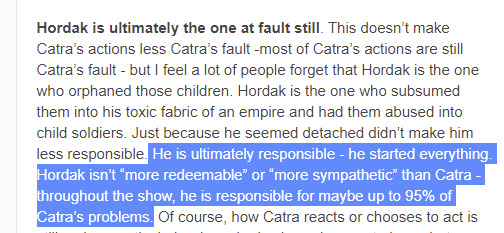
Catra was directly abused by Shadow Weaver throughout her childhood. That makes Shadow weaver responsible for 100% of that abuse.
Catra was found in a box by Adora and adopted by Shadow Weaver. Hordak didn’t know or care that she existed.
He is responsible for the war, he is responsible for the war casualties and the property damage. He is not responsible for Shadow Weaver being a terrible person and mother figure.
Again with the orphan thing. We have 5 cadets in the show.
Adora was found in a field.
Catra was found in a box. Lonnie, Kyle and Rogelio are unexplained. The only lizard ppl we see in the show are in the Horde or the Crimson Wastes. The other two could just as well be the children of some of the soldiers.

I may harp on about what a bitch Shadow Weaver is – the reason I do so is because she is legitimately terrible to the two girls in her care.
I was the unfavorite growing up, I WAS the Catra in my family who could do no right while my sibling was the golden child. I don’t however hate Shadow Weaver. She is a cartoon character in a show and she does the things she was written to do. Hell, she is a very compelling and believable villain. Her motivations are clear and she is consistent. Her voice actress portrayed her splendidly and her character design is superb. I like her but that doesn’t mean that I don’t acknowledge her role in the story. I don’t however make up parts of the story to make her more evil than she was or treat my headcanons about her as absolute fact.
Again, sigh: Prime is the worst villain in the show. He is quite literally Nyarlathotep and does this to planets:
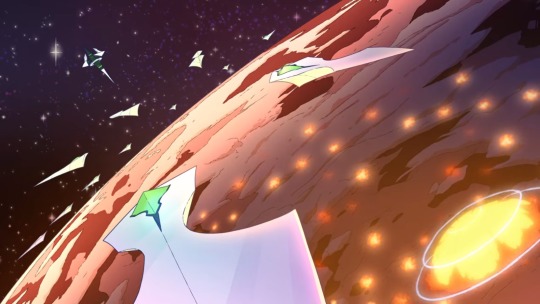
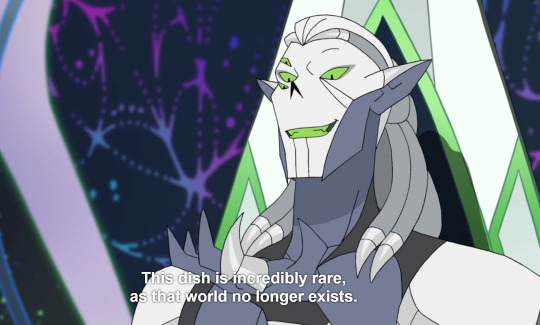
This to people:
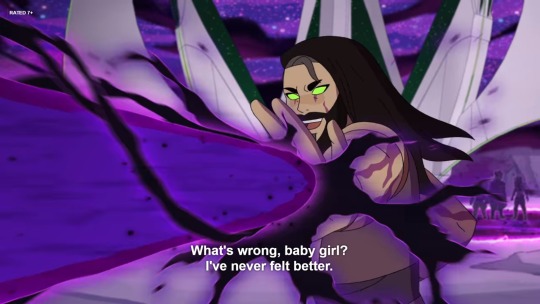
and this to the people he created to serve, worship and love him:
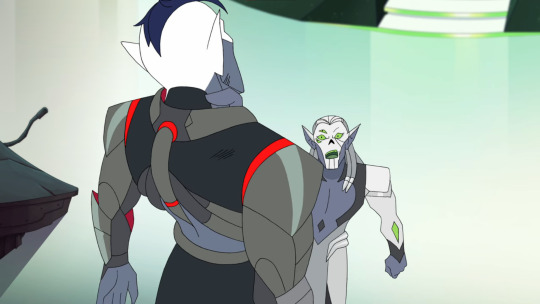
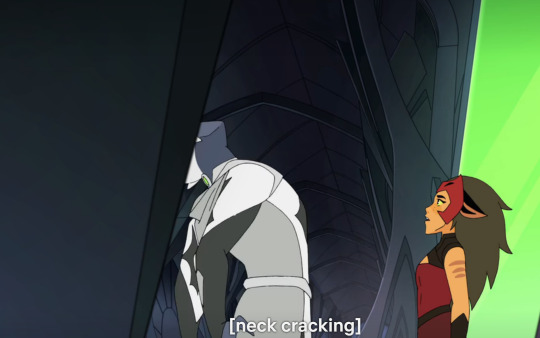
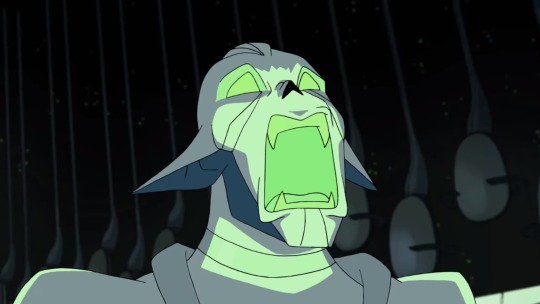
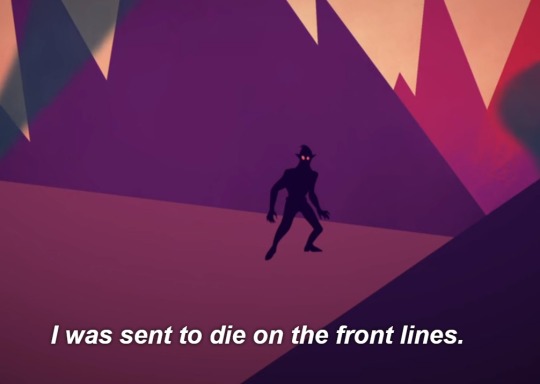
How is that not worse?

I love Catra and it genuinely annoys me when people erase her agency or try to paint her as one-dimensional victim. Catra was an antagonist for most of the show and she rocked it! She was 400% more efficient at it than cloneboy. Give the queen some damn respect and recognition! Catra had a lot of agency and her actions moved the plot of the show more than those of the protagonists. (they were mostly reactive).
Catra pulled the lever of the portal in a moment of distress after a breakdown, a Shadow-Weaver related breakdown because that’s how trauma works.
Hordak didn’t make her do it, he didn’t send Catra after Adora either. These were Catra’s choices. They came from a place of hurt but they were her choices still.
The portal was a means of transportation, not a weapon. Building it was not Catra’s mission, it was Hordak’s. He built it so he could contact Prime and either summon him here or go home –whichever course of action Prime wanted. Again, Hordak wanted to go back to this:
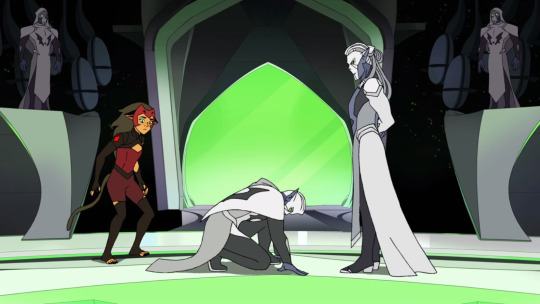
...
The only person who knew the device was dangerous was Entrapta and she tried to warn Hordak about it. Catra was the one who stopped her, violently so, then sent her to die on Beast Island- the fate Entrapta saved her from a season ago. Catra then tried to have Hordak open the portal before it was ready.
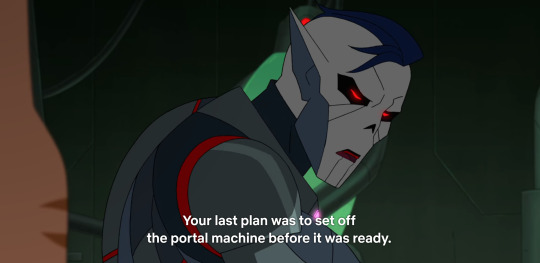
When he wouldn’t – she pulled the lever herself because that is how desperate she had gotten at that point, to show Shadow Weaver how wrong she was. That is how hurt Catra was by her mother figure’s betrayal and abuse.
Don’t take that away from her. Don’t call it curiosity or naivete or whatever. She knew the portal was dangerous but she wanted to prove Shadow Weaver wrong so badly that she didn’t care at that point. She had been pushed that far.
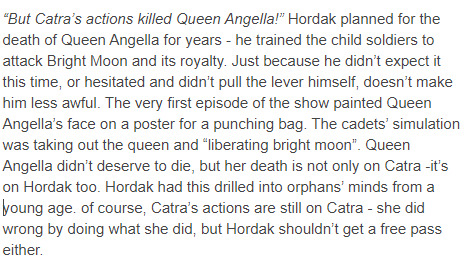
Catra’s actions led to Angella’s death but she was not directly responsible for it. She didn’t activate the device to kill Angella, it merely happened accidentally. Catra was however glad it happened and wanted to profit from the aftermath of her death.
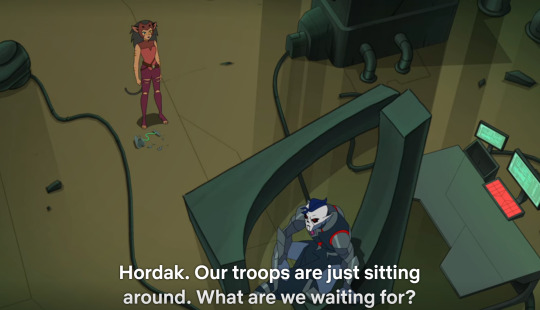
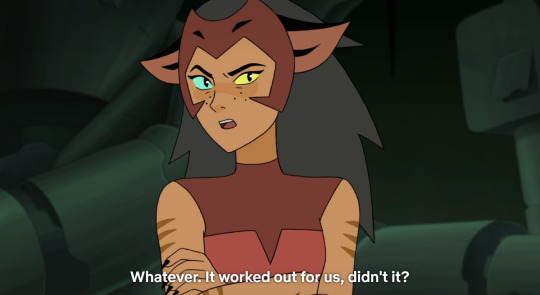
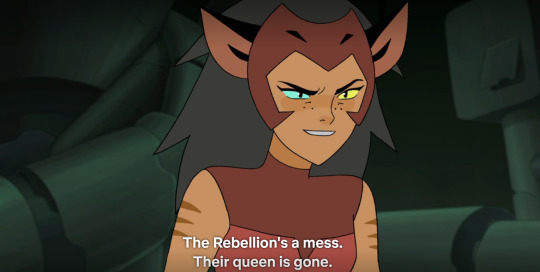
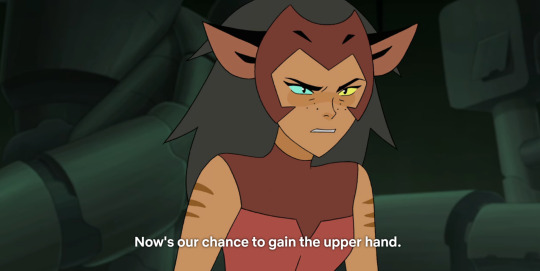
Hordak didn’t care or plan to kill Angella personally. There is no in-show moment where any of that is portrayed. Since he doesn’t care about the specifics of running the horde seem to know what they are conquering at the moment, it seems that that was usually a task reserved for his second in command.
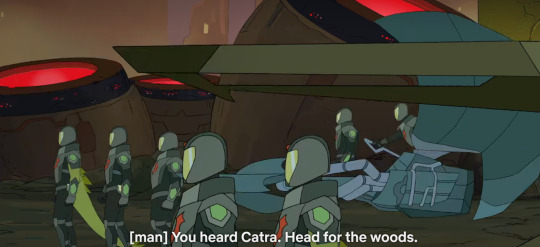
^ - troop movement ordered by Catra
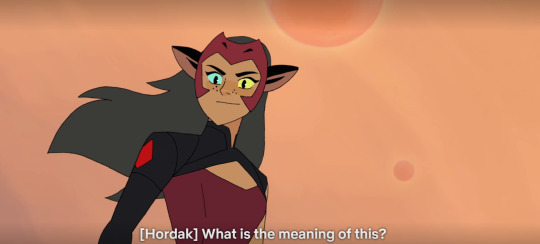


Hordak doesn’t even know what his own army is doing.

Again with the Hordak “drilling into orphan’s minds”… I seriously doubt that any of them had ever seen him out of his lab or that he came up with the propaganda himself.
Manipulation is more Shadow Weaver’s game not his. For all of Hordak’s faults, he is not deceptive or manipulative. If anything, he is woefully incapable of spotting lies. (it might have something to do with him being born in a society where lies were almost impossible because of the hive mind and Prime being able to browse his thoughts at a whim- as such, it wouldn’t be a skill he would have been able to develop).
Hordak canonically despises deception and lies. I really don’t understand where this image of a manipulative and cunning Hordak comes from. He wouldn’t be able to plot himself out of a paper bag if his life depended on it.
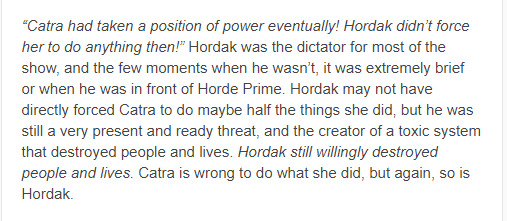
First off.. S4 Catra was his equal, not his subordinate. Don’t take that away from her. She earned it.
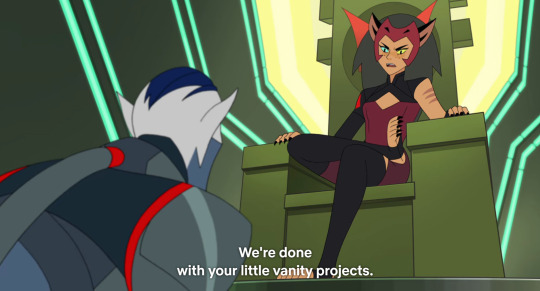
He doesn’t look that threatening here...
And again: Prime created the system. He made clone slaves and programmed them to serve. His clones have hardware installed for the express reason to facilitate his control over them. He has a religion in place to make sure their thoughts do not stray from his purpose. I am legitimately boggled by this fandom’s tendency to completely forget about his existence.Does anyone really think that these people that are born “prechipped” and programmed to know nothing but Prime’s Light are really knowledgeable about human morality?
That they would know that conquest is bad when that is the express reason for their creation?
If I were born in that situation, I’m not sure I would have known any better. Hell, if any of the clones even try to disobey Prime, they would get either mindraped (erased) or killed for the effort. They really have no choice, even if they knew that killing in Prime’s name is wrong (they don’t) they really can’t do anything about it. They have no choice but to be what they were made to be. I find it personally abhorrent when these designer slaves are held accountable for what Prime has made them do.
And to the people that say Hordak was free of Horde Prime once he was stranded on Etheria.. That is not how indoctrination works. The fact that I can’t go to church this Sunday because I’m locked in the house and can��t find the keys doesn’t make me an atheist.
Hordak was serving Prime even on Etheria. He keeps mentioning it to both Entrapta and Catra. He started the war because that’s what he thought Prime wanted of him and that’s what he’s been programmed to do. Personal and informed choice really doesn’t factor into his decision at all.

He is not sympathetic because Entrapta likes him. Notice how I haven’t brought up his relationship with her up to this point?
He is sympathetic because he literally had no choice but to do the things he was indoctrinated into doing. He was build and programmed for it, just like all the other clones. They are not able to deviate from that because of the way Prime functions and rules over them.
There is no point in the show where Hordak relishes over his status as a ruler or the “luxury” it affords him. He does not engage in the same behaviors his progenitor manifests.
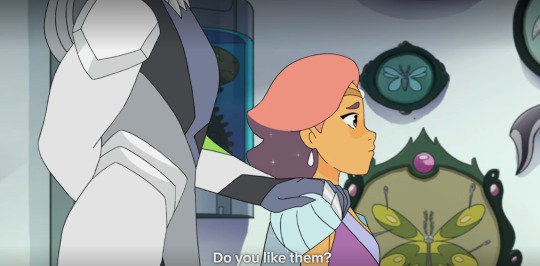
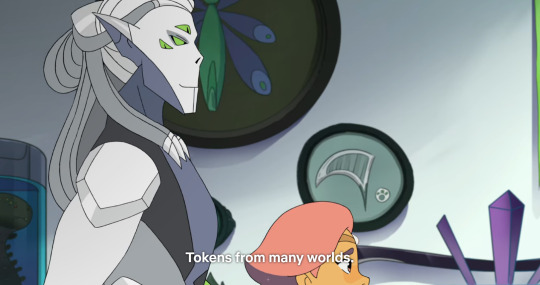

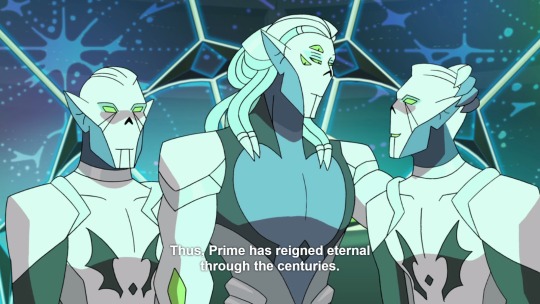
There is no point in the show where Hordak relishes over his status as a ruler or the “luxury” it affords him. He does not engage in the same behaviors his progenitor manifests. He attempts to emulate Prime in order to project authority in the only way he knows how but since those are some really big shoes to fill, he is woefully inadequate.
If Hordak had been power hungry, he would have stayed in despondos and ruled his own faction. Being away from Prime is the most powerful and autonomous he’s ever been and yet, he wants to throw all of that away in order to be a powerless, nameless part of the whole. What Hordak wanted was to be enslaved by Prime because that’s what he had been created for.
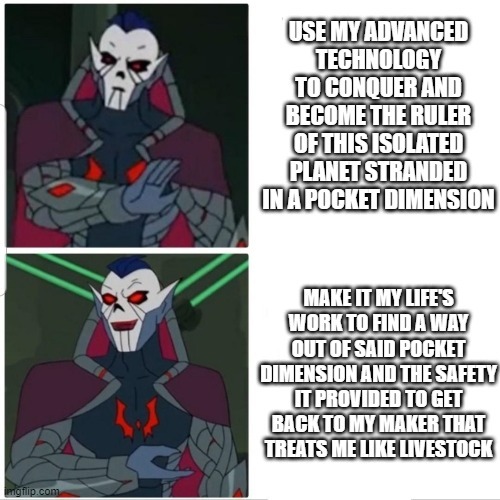
“vengeful” – and how did Hordak manifest this vengefulness? Who did he take revenge on in the series?
“apologize” – when and where in his 3 minutes of screentime would he remember everything after 2 mindwipes, realize that the whole worldview he had since inception is wrong, realize that he had been mistaken into doing the horrible things he did and then go to all of the characters and apologize for it?
Would anyone be convinced of that had it happened in 3 minutes? I’d rather they don’t redeem him than do a shit job at it.

Very true. He’s not a better person. He’s just a person in an impossible situation. Both Hordak and Catra were handed a raw deal, I don’t understand why everyone insists on pitting them against one another. They both did bad things and they were both in horrible situations. The specifics don’t really matter since neither of them would have done the things they did had they been more fortunate.

This is the exact reason for which I don’t hold Cara’s actions against her. Catra’s only model of success was Shadow Weaver. She emulated her abusive mother figure because she had no other example and because she wanted to please that woman. It does not excuse the way Catra acted but it explains it.
I really don’t understand why some people want Catra punished. I’d rather she get love and help. That is what she needs. In time, she will want to do better and be better by herself. She doesn’t need to be forced, heavens know, she’s been forced enough as it is.
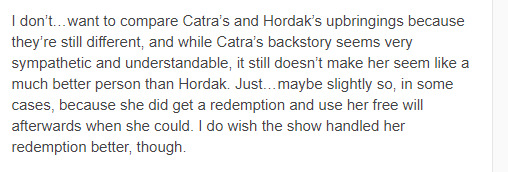
They are really different. Catra got an abusive, shitty and violent childhood. Hordak got this:
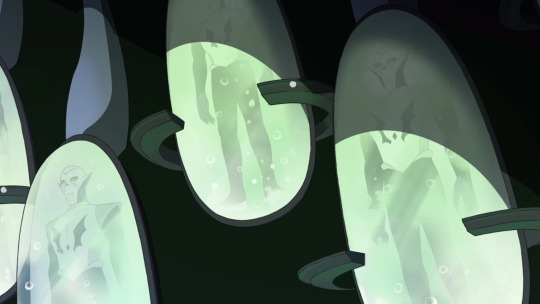
He was literally robbed of a childhood.
She was taught by Shadow Weaver that weakness gets you killed. Hordak was not allowed to have emotions to begin with, or thoughts of his own, or a name...
Comparing to victims of abuse to see which one of them is more likable is such a strange concept to me.

Catra was robbed in s5 too. I don’t hold that against her. I blame it on the writers. S5 could have been a lot better.
#Hordak#Catra#catra vs hordak discourse strikes again#can we please stop with this#it's been 6 months#my pixel is nicer than that pixel#a cartoon villain is not an actual despot#cartoon and fandom activism is not real activism#Cartoon characters can't apologize for their actions unless the writers make them#the writers in s5 were too busy with butchering the previous seasons to actually put any thought into the cohesiveness of this show's themes#everyone felt a bit ooc in s5#spop critical#spop fandom drama#spop
195 notes
·
View notes
Text
hey yes so um, i just binged two whole comic series in as many days, i think (it was a blur, i have no idea), and now i want everyone i know to read them too?

so, Princeless is the story of a princess who lives in a fantasy land where it is tradition for kings to lock their daughters in towers awaiting a prince to rescue them, thereby proving that they’re worthy of the princess’s hand in marriage and to rule the kingdom. obviously, our protagonist Adrienne, the second youngest of seven sisters, is not down for this bullshit. after being locked up in her own tower, Adrienne eventually escapes with the help of her guardian dragon Sparky, and sets out on a quest to free the rest of her sisters from their own towers in order to prove that princesses don’t need a prince or knight to save them.
what ensues is a delightful little all-ages comedy action-adventure comic about feminism, finding yourself and your purpose, with plenty of wonderfully heartwarming moments along the way. and plenty of clever and interesting subversions even around that initial premise! (but i’ll talk more about that under the cut)

then there’s its spin-off series Raven: The Pirate Princess, aimed at a slightly older audience, about a “princess” (that isn’t her sister) that Adrienne saves along the way. Raven is latest in a long line of pirate “royalty” who began their legacy by rebelling against the tyrannical kings of the mainland. unfortunately, her brothers convinced her father that, since he is the “Pirate King” he should also lock his daughter in a tower to await rescue (so that they can steal command of the fleet from her when she was in line to inherit it).
this story begins shortly after Adrienne frees her (Princeless, Vol. 3 if you wanna just get the backstory and dive straight in to this series; Princeless is great, but lesbian pirates, i get it if you just wanna dive straight in), and she sets about putting together a crew to hunt down her brothers. this one’s got it all: fencing, fighting, torture, revenge, giants, monsters, chases, escapes, true love, miracles! ...okay, so there aren’t any giants (unless you count the absolutely gorgeous Katie Kling) or torture, but... it has got lots of lesbian pirates! and birates, and a couple of adorable ace pirates who just love science and blowing things up (i love Cid, and if anything happens to her, i will kill everyone in the world and then myself). and a demisexual pirate. and they’re almost all adorkable nerds who, before joining a pirate ship were all part of a boardgaming group/book club(/fencing club/survival scouts).
okay, so a bit more spoilers for Princeless beneath the cut, just in case you haven’t been convinced to read it yet:
okay, so i didn’t really know how to explain this without giving major plot stuff away (last chance to turn back from spoilers), but the series is actually so much more inventive and clever than that summary lays out. first off, i didn’t even mention Devin, Adrienne’s brother who is an utter disappointment to King Toxic Masculinity (not his real name, but you get the idea) because he likes to sew more than swordfight. or the fact that Adrienne’s escape made it look like she’d been killed, and then when she arrives at the castle, disguised in armor, everyone thinks this dragon-riding knight is the one who killed her, and so she winds up with a bounty on her head for killing herself... anyway.
Devin finds out it’s actually her while she’s at the castle, and tells their mother after she leaves who then sets out to do something, but her carriage is later found in the woods also burnt to a crisp with her nowhere in sight. now, as soon as this mystery gets presented, pretty much anyone who has read anything will figure out what’s going on, and i’m not entirely sure it was ever even intended to be a real mystery, but it is an all-ages comic, and i can imagine some kids, at least, not being able to figure it out so quickly, but moving on...
Devin then sets out to solve the case of what happened to his mother, and along the way forges new allies, and discovers new threats to the kingdom, and it’s all great and wonderful, and helps build some background tension behind Adrienne’s escapades that she remains totally unaware of.
speaking of Adrienne, this is the bit i really wanted to talk about down here which is that... remember that premise? she’s going around saving her sisters to prove that princesses don’t need a prince to save them? well... turns out all of her sisters basically save themselves. that’s not to say Adrienne doesn’t help, or have agency in her own or her sisters’ stories, but like... when i realized that subversion and how it perfectly reinforces that “princesses don’t need saving” thesis... i was just so giddy. it’s so good. also, Adrienne learns a lesson that “freedom” doesn’t look the same or mean the same thing to everyone else as it does to her. this theme gets introduced and played with very early on, built upon, and then explicitly called out with her last two sisters, and the whole progression is just... [chef’s kiss] have i mentioned how much i love this series?
121 notes
·
View notes
Text
From anon: I don’t know how someone can be as intelligent as you behind this blog and still ship Vmin and Namjin.... where j*k*ok is known for being the most realistic Jimin-ship and Namjin is known for being creepy for feminizing Jin to extreme extents. People that ship namjin give me chills honestly. Majority have this twisted fantasy of om*ga Jin x a*pha Joon which is so disgusting.
Thank you, I guess, for this backhanded complement (which I'm saying with the utmost amount of sarcasm, just so we're clear). Quick question though, if namjinists give you chills and you aren’t a vminnie, what are you doing on a blog that is mostly about both?

While I won't get into why I don't agree with your statement in regard to J*k*ok, and therefore by proxy about vmin, I do very much take offense against what you said about Namjin and namjinists. While yes, there are people who do what you said they do, there is an overwhelming majority of those who don't. Since there is no way for me to check every single account of a namjinist and ask them if they feminize Seokjin or see him as om*ga in their fanfics/fantasies, I can use the power of AO3 as place to get some data to check this argument, since a lot of this is reflected in what people write and how they characterize the members.
More below the cut since this could be a topic/discussion some might not want to read about or even see on their TL:
Since 2013 there are 153k fanfics for BTS across all available languages, out of which 7863 have the al*ha/b*ta/om*ga dynamics tag on them, meaning just about 5% of fics fall into that "genre", which is basically nothing. Because I was curious, I checked both designations for each member and created a table, the result being this:

Now what do we have here, 45% more results for O for Seokjin than A though that's barely anything when compared to the 70% of O for Jimin, meaning even if Seokjin is seen as O, it's much worse in Jimin's case. And while yes, a majority of those % is due to namjin fics, the majority in Jimin's case is due to J*k*ok ones, so really, who are the bad (feminizing) guys here? Even more so when you consider that there are 2.1k J*k*ok fics in this category (without otp:true) as opposed to 1.6k namjin ones. Also, before someone argues that vminnies are just as bad, there are only 631 fics with that tag for vmin and 1.4k for y*onm*n, which covers the three main Jimin ships.
Then, because I was still curious and I like numbers, I thought I could check the other two much debated tags for comparison purposes:

As it turns out, these results are not great either, though comparatively far worse when it comes to Jimin, though judging by how certain parts of the fandom (and especially shippers) treat and see him, and portray him as, I can't necessarily say I'm surprised.
Now, what does all of this tell us?
For one I think it showcases a big issue we have when it comes to mlm ships within those writing about Bangtan, but also in general, the fact that in large parts many write mlm not because they are gay themselves, or even queer, but because they enjoy their ship and base their way of writing them on stereotypes and by projecting heteronormative ideas and norms onto them, consciously or not is up for debate. There is a whole discussion to be had about when certain writers portray queer characters/real people respectfully and when it turns into blatant feminization and even fetishization, but I'm neither the right person nor am I equipped or informed enough to be the one to have it. There have been countless others who did a brilliant job of it so if this is a topic that interests you, I'm sure you'll be able to find resources and posts about it with ease.
Now, as someone who is queer myself and likes both vmin and namjin dearly, I think it's uncalled for of you to come into our asks and make such claims about namjinists, especially toward someone who never exhibited any such behavior themselves, as in me. I know a lot of namjinists, I watch the community and read their discussions as best as I can, and I enjoy reading a good fic from time to time. And while yes, there are problematic writers who do what you accuse them of, as well as shippers more generally speaking, such people can be found for every ship, their amount those vastly varies.
I don't ship vmin and namjin based on some kind of fantasy version I have made up in my head of them, nor do I read a/*/o myself since I find the whole genre repulsive, so I don't see how you thought this would be an effective argument for whatever you thought this ask would achieve. I base my ship related thoughts, opinions and analysis entirely on what the members show us, the personalities they have, the things they've said and done, and the music they have written. I don't subscribe to any weird conspiracy theories and I don't subscribe to the idea either that the "smaller" one in a ship plays whatever role as opposed to the "bigger" one, or even the idea that relationships have set roles because that's not true for straight couples so why should it be the case for queer ones?
Anon, you can dislike shippers who go too far, we all do, and while I agree that people who still "force" their weird ideals onto Seokjin while "forcing" stereotypes onto Namjoon simply because he's tall and buff are disgusting and wrong, I'm not one of those people. And neither are most of the people who send in asks or have sent me DMs to talk about namjin. There are other sns where these behaviors are exhibited to unimaginable extents by (mostly) women much too mature to be talking in such manners about young musicians half their age or more, perhaps you should send asks like this to them instead.
At the end of the day, how “real” a ship is has no correlation with how big it is or the way people fantasize, write and talk about them. The only deciding factor are the people that are actually involved in the ship itself, not its shippers and their beliefs. Sometimes it worth it to make up your own opinion instead of following the “popular” one without question, or letting toxic shippers taint your opinion of everyone that likes a certain ship.
#answered ask#answered ask by admin 1#what is it about our account that seemingly attracts there kinds of asks lately#also why did these anons choose pride month and festa time for asks like this
36 notes
·
View notes
Text
College Lecture
Spencer Reid x f.reader
(gif doesn’t belong to me)

masterlist
plot: Spencer reveals his crush for you drunk
warnings: drinking, most fluff
important: mostly told by spencer’s pov
word count: idk
—• • •—
Dr. Reid was grabbing his bag as he stood up from his desk. He had finished quickly his paperwork from his last case and he was looking forward to leave quickly the office, which made his coworkers curious as to why he was in such a hurry.
"Pretty boy!" Exclaimed Derek Morgan as he sat down on top of Spencer’s desk, looking at the doctor. "Where are you going so fast? Is there a discount on dictionaries?"
"Ha, I got that joke," said Spencer not even in a sarcastic tone, he had his mind in another world to even come up with a good comeback for Morgan. "I... Uhm... there’s a... there’s a thing that I need to go to."
"What thing?" Asked Morgan again, catching the other BAU members’ attention by his curiosity.
"Uhm... a college... a college lecture."
"A college lecture," repeated Derek in a slow tone, making JJ chuckle. "And what is this college lecture about?"
"Feminism in 19th Century Literature." That surprised everyone agent in the office at the moment. "And I’m late so..."
Emily stopped Reid placing a hand on his chest, making it impossible for him to sprint out of the place.
"I’ll go with you," let him know Emily with a big smile.
"Me too," announced Garcia and Morgan weren’t slow and joined in too.
Spencer was getting more and more nervous, and his partners could easily tell. That’s why they wanted to go. He was hiding something about this lecture that he didn’t want anyone to know, and they were so curious to know what.
And as soon as they arrived at the auditorium, he could have an idea of what was getting all of Dr. Spencer Reid’s attention.
Because as soon as they arrived, his eyes couldn’t help but stare at you.
How you moved around through the little stage pointing out facts about the Brönte sisters with that big smile of yours. How your bright hair was being waved by the wind as you turn around. How your eyes shine with the light of the projector, revealing that look that made him feels things, strange things, good things.
He first came across you a few weeks ago when they had a case in Chicago. You were doing a lecture there and he was supposed to go ask a professor about something related to the murder, but your voice attracted him to you.
He sat there for hours just listening to your voice. For the first time in his young life, he was interested in the speaker rather than the subject of the speaking. He couldn’t focus on Jane Austen when you were the one talking about her.
"Thank you," you finished, receiving applause for the future English Majors and Spencer, who forgot that his coworkers were next to him and he just cheered you up.
"Ok, Doc," said Garcia, "that was interesting. Didn’t know you care so much about Pride and Prejudice."
"Huh? Oh yeah, it’s one... it’s one of my favorite... books," he continued to lie, and he was terrible doing it. "Ok, we can go now."
"Doctor Reid?" You called him as soon as he stood up from the chair. He stopped moving and stood there, nervously, as he closed his eyes. "Is that you?"
"I think they saw you, Reid," mumbled Hotch, making the team chuckle.
Spencer slowly turned around, smiling at you, not helping to blush a little.
You felt curious. He assisted in your last three lectures and you weren’t changing the material that much. You knew him since he introduced himself the first time you guys met, as he stumbled late to one of your speeches.
You talked to him for a few seconds after it ended. You were trying to initiate conversation while he was being evasive, not wanting to talk at all. He just told you his name and some random facts about contemporary literature and then left in a hurry. You were surprised and also confused to see him again, in a different state.
"Professor Y/L/N," he said. "So good to see you again."
The whole team followed Spencer as he walked downstairs towards the stage, where you stepped closer to where they were, with a confused yet sincere smile as the came closer.
"Good to see you, Doctor. Didn’t know that an FBI member would be so interested in Literature Feminism," you said with a small chuckle at the end. "These are your friends, I assume."
Spencer had completely forgotten about the presence of the team, who were collectively thinking that spending an hour of their time listening to you became worth it the minute they saw Spencer’s eyes as they stared at you.
"Yes... Professor, these are Morgan, Emily, JJ, Hotch, and Penelope... guys, this is Professor Y/N Y/L/N. She’s a Yale alumna in Literature, a writer, and gives lectures in colleges around the country."
He was talking so fast he didn’t realize he gave up most of your curriculum, but you didn’t mind. Most people would find it creepy, but you find it just curious, you found everything about Spencer Reid curious. His actions, how he repeated words since for him it was difficult to put into sentences every thought that was constantly in his mind. He worked fast, he was constantly thinking, analyzing.
"Thanks for the info, Spencer. We catch bad guys," said Penelope and you chuckled, making Spencer smile.
You’ve only spoked a few times with him after the lectures he assisted and every time he surprised you more and more with his intellectuality and his capability to memorize everything.
"How long are you staying in Virginia, Professor?" Question Agent Morgan and Spencer felt curious too.
"Until the day after tomorrow. I’m giving a lecture about Hemingway tomorrow afternoon, why?"
"Oh, well, because Spencer thought that it would be a brilliant idea to invite you to the bar for some drinks." Spencer opened his eyes abruptly.
"I did what—" Morgan stepped on his foot. "Ouch! Yes! I did! Yes!" Spencer exclaimed in pain, making you smile confused. “Yes, Uhm... sure, you should... you should come with us for... drinks, yep."
You smiled. "I’d love too,” you whispered. "I’ll go grab my purse and I’ll be right back." You left after giving Spencer a soft look, walking quickly to get your bag.
As soon as you left, Spencer immediately turned around to face Morgan who was just laughing, such as the rest of the team.
"Why would you do that!?" Exclaimed the doctor. "I was going to ask her out."
"When?" Questioned Derek with a dumb smile, still making fun of Spencer’s actions around you and how nervous he was.
"Eventually," he replied, not proud of his response. "Did I act too bizarre?"
"Other than the fact that you told us by memory her entire biography, I would say pretty normal," mocked JJ making him sigh. "It’s okay, Spence. I promise you that she didn't even notice.”
"Are you sure, JJ?" Questioned the Doctor as he tried to hide his nervousness. The idea of going out with you, of dating you, not only terrified him but also made him doubt his own abilities. Was he good enough for you? Was he smart enough for you?
"No, I'm lying. She definitely noticed, " she mocked before pressing her lips together, regretting it. "I'm sorry, I should have said that."
"No, no, don't worry, I'm just... Not for jokes right now JJ, " he whispered. "There she comes, " he said to himself as you came back with your purse and a shy smile in your face, which was directed to him. "Hi! Again... Hi again, " he greeted, awkwardly, making you giggle.
"Hi again, Spencer. Shall we?"
— • • • —
You were sitting on the counter by yourself waiting for the drinks, while the rest of the group was at the table. All the BAU members were insisting on Reid to stand up and walk towards you, but he was too nervous to do so. He decided to just look at you as he played with his glass with ice claiming to be refilled with an alcoholic drink. He was just glancing at you, admiring your charm.
He had a huge crush on you and it was hard for him to confess it. His friends were teasing him about it and he was annoyed by that, but deep down he recognized that it was true. That he liked you. He wanted you.
"Ok!" You yelled excitedly as you arrived at the table with the drinks that everyone ordered. "Hotch, your whiskey on the rocks, boring." Everyone laughed. "And for the rest, I got us... tequila!" You chuckle while everyone cheered, minus Spencer, who was too focused on you to even be excited about the break from work and the hanging out with his friends. "Here you go, Doc."
"Oh, I don't want, " he replied as you sat next to him, making him tremble by the quick touch of your leg against the fabric of his pants.
"What!? Why not!?" You exclaimed as you put a strand of your hair behind your ear and drank the first shot. "Come on!"
"Yeah, Pretty Boy, " intervened Derek after drinking, making Spencer stare at him. "Probably, it'll help you loosen up a bit, don't you think?"
You looked at him with a sincere smile, and he couldn't resist. He couldn't resist you. The way you made him feel was... different, unusual for a guy like him. He has never felt it before.
And after a few drink, he finally could loosen go as Morgan said, and started telling you exactly how he felt.
"Did you know..." he began, grabbing your attention, "I assisted way more of your lectures than you think I did? I only said hi in like three of the ten I assisted. I didn't know there was so much to talk about Emily Dickinson."
"I believe that's enough shots for the Doctor, " pointed Garcia making everyone giggle, but Spencer didn't even notice, he was busy with admiring you.
"Did you know there weren't blue M&Ms till the 90s? What kind of M&Ms did 80s people eat? The yellow ones? Losers." You laughed. He was so drunk and you found it hilarious. "I like your laugh."
"Well thank you, " you replied. "And I will agree with Garcia: you’ve had enough alcohol for today."
"You don't have to take care of me!" He exclaimed. "Actually, my brain works even faster when I'm under the influence of alcohol and that's why... I can't even put into words all of my thoughts! If you looked into my brain right now, you’d see a complete mess! There should be a machine that lets you see into someone else’s brain! Did I just invent a Nobel Prize Award invention?"
"Ok, drunk Reid is killing my mood, " mentioned Emily. "I think it's time to go home, we have work early in the morning."
You nodded, drinking the last sip from your glass and standing up. Everyone stood up too, chuckling by the state of the other, smiling for the great time they’ve just spent with each other.
Reid was the last to stand up. He struggled to maintain balance while Hotch helped him to get up. He looked at you with a little smile while you grabbed your purse and crossed it over your chest.
"You know... Y/N." You raised your eyebrows when he mentioned your name. "We should date."
You hadn't even reacted when Morgan and Emily intervened quickly, dragging Spencer away from you.
"That's enough, Reid, " said Morgan. "Nice meeting you, Y/N. Let's go, Doc."
"Call me!" He yelled. "I like you!" And that's the last thing you heard from him before Morgan finally got him out of the bar. You simply laughed.
— • • • —
Spencer Reid arrived at his office with the worst headache in the world. He quickly prepared a strong coffee and drank it all as he walked towards his desk, falling to the chair and closing his eyes.
"How's your head, Spence?" Asked JJ and he just groaned. "That bad, huh?"
"I just want to die, " he said with a deep voice.
"Reid..." Hotch called him as he walked by. "The Professor is here."
That words made Spencer open his eyes widely, looking towards the entrance where you were standing, glancing towards him with a tiny smile.
As soon as you saw his reaction, you doubted coming there. What if he didn't want to see you? You went there by an impulse. What he said the previous night didn't let you sleep and you wanted to clear everything out. His voice wouldn't stop repeating in your mind, repeating those words every five seconds. You needed to see him.
"Oh, God..." Spencer mumbled to himself as he stood up. "What's she doing here? What did I say yesterday?"
"You may have confessed your crush on her, " answered JJ, making Spencer panic. "Go!"
He nodded before walking slowly towards you, with a nervous smile on his face as he came closer. You noticed how strange he was acting and you tried smiling at him to calm him a little, but that just seemed to make him even more nervous.
"Professor Y/L/N, " he greeted you. "How can I help you?"
"I just needed to clear some things out and—"
"I'm sorry if yesterday I said some things that made you uncomfortable. I don't even remember what I said and I just hope that we can move past that."
"Oh... oh, yeah... Uhm... ok, " you stuttered. "I just thought—"
"What?" He asked curiously.
You breathed in.
"Why did you attend all of my lectures, Spencer?"
That question took him by surprise.
"I don't know, " he admitted. "I just... liked how you talked so excited about literature. Your voice tends to increase a tone when you arrive at the Jane Austen material and it's clear she's your favorite author. Your shoulders relax when you notice someone in the audience taking notes because now you know they are paying attention and are interested in the subject such as you. Your voice gets slower as you reach the end of your speech because you don't want it to end, you love it, you love teaching other people and showing your passion to everyone. You love every second of it."
You nodded.
"Why?" He questioned.
"Just wanted to make sure you weren't a literature maniac and the only thing you cared about was what I was talking about."
"No, I'm not as passionate about literature as you are." You gave him a little smile. "Would you like to go out sometime?"
"Yeah... I'd love to go out with you, Spencer."
"Great..."
"Great."
#spencer reid x reader#spencer reid#reid#criminal minds#y/n#pov#fanfiction#reid x reider#spencer reid x y/n
298 notes
·
View notes
Text
Is it possible to like anything? Mixed thoughts on morality, turning a blind eye and "The Matrix"
I care a lot about media, and communication. As a guy that has some issues talking about exactly how he's feeling and has low social energy, things like shows, movies and books were a lot more important and relevant to my formative years than interaction with other people – not that I didn't have friends on my teen years, I did, just. Well, a lot of stuff to consider at that time that is irrelevant to this stream of consciousness. Something that I also care about is the message said media brings, and how that is inherently linked to who wrote, or directed the piece of media. This brings question to some of the internet's most infamously discussions: is it "ok" to like something made by someone that does very questionable decisions? I honestly don't have a definitive answer for that. More often than not, this kind of discussion feels to me to be in a vacuum in the internet, or of less politically inclined people. There are good articles out there, but they never seem to demand you not watch something, but to make people reflect on the bad writing, direction or production something got. Which I think is the way to go. Most of what I read and watch of radical left doesn't even mention such an issue with representation and how it should be completely isolated and burned to the ground, as I'm afraid they're more concerned with some more "tangible" problems, like the rise of imperialism, neoliberalism and fascism and imperialist and neoliberal feminism as a tool to maintain the capitalist system, often times built by people of color and resources from the "Southern" countries, and maintained cleaned and pristine by women of color (VERGÈS, 2019)¹.
I'm just a guy in his mid twenties with a degree in graphic design and a thesis in communication design. I didn't study political science in university. So I think I can do my part by talking about communication, then. Also I will try not to pull info out of my ass.
As some people might know from now, Matrix "4" Resurrections' trailer launched this week, and with that, some people were kind to remind past's fuck ups of Lana Wachowski regarding race in many of her works, like Sense8, Speed Racer and Cloud Atlas. Listen, I can't ignore the fact that the decisions made in these films are in the very least, questionable and distastful, specially regarding Asian people. Also she really out there rocking dreads, which I'm not even gonna get into, as I think it's already very well established why that's not a good look for white people. I only watched maybe one episode of Sense8, but this article here sums up pretty well what's weird about it. It also brings a good message by the end.
So, can you like anything without being morally crushed by what you know is right? Can you enjoy a piece of media that is flawed by the creator's White Gaze/Straight Gaze/Cisgender Gaze? I admit I have a hard time dealing with feelings of morality. It feels rather individual and super subjective on most accounts, and doesn't leave out (ironically?) a lot of nuance for different cultures and practices in the world. I wanna talk about that more in the future. Either way, about media, I'm of the opinion that you can enjoy those things if you wish to. Fuck it. Make it your own. Be critical of what you consume, as most things we do are made under the wing of big corporations owned by people that don't care about us, if we need screen time or actually be portrayed as a human being.
If anything, I would like to plead that people pay more attention to the independent side of media creation, if possible. The internet has its advantages in that regard. Don't lock yourself in on Netflix and [insert other streaming services here] and its desperately neoliberal vision of queer people. It's hard, but there's many POC and LGBTQIA+ folks that work hard to bring better stories for people just like them. Look for POC that make books and short films and documentaries. By comparison, it will be easy to spot how flawed The White Gaze makes when telling a story.
I'm gonna talk a little about The Matrix (1999) below, so I'm gonna do one of those fancy "Keep reading" right now.
So, I re-watched The Matrix (1999) yesterday and found the plot with Cypher turning against the other members of the Resistance as a pretty good analogy of what most people live their lives currently, under capitalism and overconsumption: Willing to throw your group under the bus, to literally destroy the remains of human existence that are still left, for the comfort of being blissfully ignorant. "I wanna be rich, and someone important, like an actor", he said to Agent Smith, that probably wouldn't fucking do that even if the plan did the way they wanted to. I like to believe it was the greed of the few that brought down humanity by their own creation in the Matrix universe, but unfortunately that is not brought up, in that case, bring in that "humanity" as a whole did it. There's another scene, when Agent Smith is alone with Morpheus, where he monologues about how "humanity" is a "cancer" for the Earth, for "abusing all the resources from an area and have no way to survive but to move to another area". This again shows the lack of perspective from The Wachowskis, blaming humans, that have existed for thousands of years, for the environmental atrocities that capitalism, that has only existed for a couple hundred years, has caused to the planet.
Like I said, it is okay to like things that can be questionable. I like this slip that the character Cypher is. He is the embodiment of a lot of issues and he is inherently opposite of our "good guys" characters in Matrix. I can still be critical of their lack of eyesight on what – and who – is really killing the planet, and their very distasteful idea of going post-racial when the fact is that race still very much matters.
¹ VERGÈS, FRANÇOISE, Decolonial Feminism. 2019
16 notes
·
View notes
Note
I don't get it - what's wrong with the BB interview? Even you've addressed how PTD wasn't that great yet still raced to #1. They could change their rules but to what exactly? It's a popularity chart. If the same people are streaming the same song over and over - is that not precisely what manipulating the charts is? I mean, we're smart and found a great loop hole but how is this great for the boys? Making them think they're more popular than they actually are? PTD was weak, man and I love them??
I'm really glad you asked me this question because I wanted a chance to talk about what I did find insightful about the article. To be honest, when I started reading the article I thought "They're right", but the more I read it the more the lack of professionalism and the clear agenda it had bothered me.
First of all, talking about chart manipulation isn't a bad thing. But paying a group to be on the cover of your magazine and mentioning their achievements only to question them isn't the right way to do it. You think they'd do this with anyone else? Had it been Dua Lipa, the article would've been about her artistry and achievements in the industry, and she would've been portrayed in a positive light. Did BB even treat BTS as artists? To me they were only treated as an interesting phenomenon.
BB could've done an exposé on BTS and chart manipulation, but not like this. It's a bit rich for BB to question BTS only. Instead of opening a discussion about the merit of the charts and the ways the industry circumvents BB's guidelines, the article points fingers only at BTS, implying that, in contrast with Dua or Olivia, BTS are cheating the charts. BB essentially avoids taking responsibility for its own methods and its influence in the industry by saying BTS are the only ones compromising the legitimacy of the charts and their value. It's an easy way to make BB look good and BTS look bad - the charts and the US industry aren't the problem, BTS and the Korean music industry are. Throughout the whole article, the way they talked about the "fascinating" case of HYBE and BTS's success felt more like an insult than a compliment, or even an objective analysis. Anything related to Kpop or Korea was more or less used against BTS.
Second of all, the way they discussed chart manipulation was deeply flawed. They didn't lie about Army's strategies nor were they wrong to question the ethics of mass buying, but they should've done their research first. Quoting twitter users, alluding to "experts", admitting they didn't know exactly how Army operated, etc. is really bad journalism. They want to expose BTS for chart manipulation without proper evidence? The language they used conveyed ambiguity and uncertainty too. They never explicitly stated things, it was all hearsay. What kind of journalism is this?
But, again, even if they had done their research, targeting BTS without likewise exposing other artists on the charts is having a clear bias.
The article was also very interested in HYBE. This is another interesting topic, sure, but HYBE isn't BTS. If they wanted to write about HYBE they should've done so in another article. And it's telling that they talked about HYBE almost exclusively in an unflattering light. What they said wasn't false: for example, they questioned the company's longevity and worth due to their undeniable dependence on BTS - I agree with that, but what about HYBE's success story? BB aren't anticapitalism. They are pro-money hungry companies, and HYBE is certainly smart when it comes to money. Were it any other company, BB would've been all over that. But with HYBE they mention Army, and how HYBE exploited the fan-artist relationship, as the reason behind the label's success only to make HYBE and Army look bad. Artists profit from their fans, but usually no one talks about it; it's bad form. We talk about how cool and iconic Beyoncé is, not the amount of money she made, directly or indirectly, from her fans - or rather, the money she makes from her fans is legit and not worth questioning, unlike the money BTS make from Army. (As an aside, had Beyoncé been on their cover, do you think BB would've questioned the legitimacy of her feminism/activism due to the money she earned from a clothing line made at sweatshops employing mostly woc?...)
I agree that the relationship between BTS and Army is interesting, but streaming is only the tip of an iceberg that BB didn't bother to uncover.
To me, it's clear they had an agenda. The way they spoke about BTS's diplomatic passports, HYBE, Army, the charts, etc. - all of it had a negative connotation and contributed to the narrative of BTS being shady or puppets, or whatever. It was more of the "dark side" of Kpop. Why does no one talk about the dark side of American pop?
Also, like I mentioned, the article tackled too many topics. If you want to talk about HYBE, write an article about HYBE - the company's executives were quoted more than most of the members; it doesn't make sense. And if you want to talk about chart manipulation, that's a separate topic that shouldn't be the main focus of a magazine Army is expected to buy. Who, if not Army, is expected to buy the 7 different editions for each member? Army is supposed to buy an article slamming them and BTS?
There is a time and a place to discuss these things. Most of what was said was legitimate, but the authors twisted the truth to fit their narrative when they refused to do actual research on the topic, quoted fans of artists competing with BTS on the charts, and refused to look at chart manipulation as a whole and how other artists are attempting it as well (they even pointed out that other artists' fans try to do what Army does but less successfully - which is why they are... what, more innocent than Army?...).
Another thing that was unprofessional was the fact that BTS were rarely quoted directly. On the last part of the article, regarding the English singles, I can't even form an opinion on what was said due to the ambiguous, even manipulative way, the section was written. They quote an executive on how BTS compromised with the company and make it seem like BTS were unwilling to release English tracks (which fits their narrative), but they don't quote the members themselves. In the initial article I read they noted that RM remembered the situation differently and quote him saying "There was no alternative", which made it seem like RM was never in conflict with HYBE. But now the article states "RM wasn’t fond of the idea, though he acknowledges it was a crucial way to keep buzz alive during the pandemic. “There was no alternative,” he says.", and now it seems like RM opposed Dynamite at first, contradicting the initial article. This correction only corroborates with BB's narrative. But what about the members that were allegedly in favor of the single? And why is Jin only quoted to share the struggles of recording the song? Why was nothing positive said about Dynamite when we know for a fact they must've said it? It simply wasn't interesting to BB. The members were only quoted when they had something juicy to say, and we were never offered much context or told what question they were replying to, what tone they used or how it fit the real time conversation BTS were having with each other and with the interviewers.
Essentially, although the writers didn't lie about most things, the article was biased, ambiguous, unprofessional and lacking in direction. It was like three insufficiently researched and prejudiced articles in one.
Also, while PTD wasn't that great, there are many not so great songs that make it to n.1 on BB. Being great has nothing to do with your results in the chart. Many artists make songs no one really likes yet we're forced to listen to them on the radio anyway. Fans streaming like it's their job and bulk buying songs isn't right, but at the very least you can say that it is their choice, and it reflects the fans love for their artist even if it doesn't always reflect their love for the song. A lot of American artists have it easy and top the charts with generic songs that the GP listens to without even meaning to - they're just shoved down our throats by their labels. That's chart manipulation too, isn't it? What is BB supposed to represent? Popularity? If so, maybe BTS don't deserve the top spot, but maybe those artists who do only get that number 1 because their labels know how to put them up there. If more artists had the same treatment that artists like Dua Lipa get, then maybe the n. 1 song would be different. Isn't that chart manipulation as well?
#ask#bts#billboard#I hope I expressed myself correctly#this is a long post but whatever#thanks for the ask#sorry for any typos
8 notes
·
View notes
Note
Okay, so I want to be clear when I say again that white women in the suffragette movement said/did racist things, just as white women in feminists movements today say/do racist things,. Even white anti-racist activists will, at least on occasion, say and do racist things simply by growing up in a white supremacist society. I don’t want to give the impression that I’m disputing that reality. I only mean to illustrate some of the nuance (and why that matters today).
I sent those quotes in an effort to illustrate how the women’s suffrage movement was intertwined with universal suffrage, both white women and black men campaigned for each other’s right to vote. The women’s suffrage organizations grew directly from the basis of abolitionist movements. The initial suffrage (and wider women’s rights) movement was indistinguishable from the civil rights movement. When the 14th/15th amendment was proposed splits in the civil rights movement deepened — both white women and black women (and presumably some black men) campaigned against any amendment that didn’t include women. Similarly, black man and both white and black women favored the 15th amendment even without including women (of any race), who argued that women could wait. Ultimately the latter group saw their wish, and the division resulted in two separate organizations that continued to campaign for women’s suffrage.
The quotes you screen-shotted are undeniably terrible and exemplify the racism within the movements. To be nuanced however, they also span a wide range of individuals — from actual slave owners to women who said something racist but also directly participated in anti-racist activism.
To illustrate (from the quotes you provided):
Rebecca Latimer Felton - terrible human, slave owner, all out white supremacist
Carrie Chapman Catt - she later said “our task will not be fulfilled until the women of the whole world have been rescued from those discriminations and injustices which in every land are visited upon them in law and custom”, lobbied against the word “white” being added to the 19th amendment, and lobbied congress/used her presidency of the League of Women Voters to advocate for people of color and Jews
Elizabeth Cady Stanton - she also founded the Women's Loyal National League that led the largest abolitionist petition drive at the time, organized the American Equal Rights Association a suffrage organization that explicitly supported universal suffrage. The organization split when (mostly) the black men in the organization supported the 15th amendment without advocating for it to be extended to women. (She definitely said racist things around this time, similarly Frederick Douglass, who was both her friend and one of her main critiques at the time, said many sexist things.) The split was later merged back into one organization that she headed.
Anna Howard Shaw - I know very little about her. She definitely said many racist things, but she did champion universal suffrage and campaigned to end racial violence (arguing that universal suffrage would end lynchings). Still, she also failed to condemn racist actions by her peers.
Same as (1)
Belle Kearney - terrible human, slave owner, all out white supremacist
Frances Willard - confusing mix of actively recruiting and working with black women and also promoting racists myth that white women were in danger of black men that facilitated lynchings (due to her “temperance reform”). Also appeared to be more laissez-faire when president of the WCTU since she let conservative states hold on to conservative and/or moderate positions regarding reform for both women’s rights and racial justice.
Same as (1)
As for why it matters today:
No, women definitely won’t have the right to vote revoked for discussing racism in past movements. But there’s a difference between discussing racism, and perpetuating misinformation. One of the main ways the American government disrupted activist movements throughout history was to sow dissension in their ranks. (And the American government/military taught many of these techniques to foreign countries.) An excellent example of this is the COINTELPRO operation, but it’s only the tip of the iceberg. Their goal was to divide and conquer - a movement can’t make progress if it’s busy fighting itself - and poison the public’s opinions of the movements, so as to dissuade new members from joining. (At this point, I want to reassure you that while this may sound like a conspiracy theory, it is very much proven and it/other programs did much harm to domestic and foreign reform movements.)
The myth that the suffragette movement was specifically racist, rather than operating in concert with and emerging from, anti-racist activism contributes to this divide and conquer method of disrupting activism. If you (general you) can convince women of color that the “original feminist movement” (ignoring the ahistorical nature of such the label itself) actively campaigned against them, then it’s much easier to dissuade them from considering feminist activism or to divide activist movements. (And, if it were true, it would be entirely justified!)
Of course, that’s not to say that feminists shouldn’t criticize (or disavow, to the extent possible) white supremacists like Felton or Kearney, or that we shouldn’t discuss and reform the racist sentiments in past and current movements. (In fact, I believe, and expect you do as well, that doing so is not only permissible but necessary, because to deny the racism that did exist in past/current movements would alienate women of color just as much as the idea that the feminism-of-old was solely for white women, and would in fact be an expression of racism in and of itself.)
I hope this clarifies what I’ve been trying to convey.
im surprised about the claim that white women and black men campaigned for each other's right to vote. i was under the impression that the civil rights movement was largely focused on black men and often outright excluded black women having a say, so i don't really know why they would support other women (such as white women) having a say when i heard they didn't support that for black women, who were always black men's biggest supporters.
i do get your point, to a degree-- and i think we agree overall but simply word things differently. i don't think that the women's suffrage movement was Bad and i don't think the white suffragettes back then were like, all evil and more racist than the avg white person in their society. i would say overall, those women were quite forward thinking and progressive for their time. i don't doubt that a significant portion of women were far worse than that, and even opposed women's rights (bc of the society they grew up in where this was a controversial thing). my only argument is that pretending they weren't also racist and had traits worthy of criticism (such as their racism) is innaccurate. a lot of prominent suffragettes were quite racist, and that's not to say that their feminist beliefs lead to that or that women's rights is interwined with racism, but just to point out that even those women who fought for the right to vote for women were not particularly good allies to poc but most specifically black people, and more importantly, black women. i also wanted to point out that being anti-slavery and campaigning against it, did not mean they were generally anti-racism or fighting against racism overall. they were fighting against the worst and most extreme forms of racism in their time, but they were all still racist in their own right. i'd like to reemphasise what i initially shared that you disagree with (+ my tags, and my previous comment on it so as to be fully transparent), which is not that different from what you're saying imo:
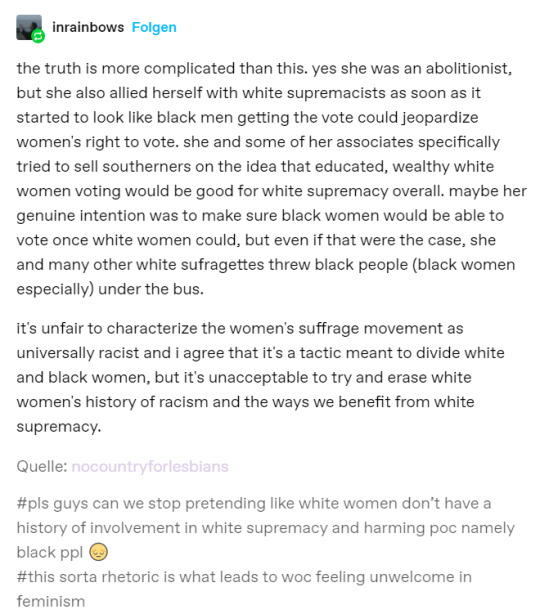

now i'm not trying to argue the origin of the movement, what it rose out of, how it relates to racism or anything else; my qualms are with the claim that the suffragettes were not racist. maybe back then, they were closer to allies to black people than most, however they were still quite racist. similarly, since you brought up white allies, white allies today may be the best we have and the best in our time, but they are also still often quite racist themselves.
my main and only point is that these women were still racist, and this is not to discount the women's suffrage movement, i just think that when we deny that aspect of the past then what we're doing is alienating woc. i've noticed a general trend of white women on here saying that white women were targetted by the KKK for example, fixation on stuff that is targeted at white women like 'karen' and placed on equal grounds with calling black women 'laquisha' to berate them, arguments that white women dont have racial privilege, etc and while i don't think the people making such arguments are necessarily coming from a bad place, many woc seeing this will end up feeling like the movement is geared towards white women and does not properly consider & include woc. that's why i take issue with the claim that xyz white female historical figure wasnt racist bc she was pro-slavery abolition, like, sure that must've been really progressive for its time but at the same time it doesn't change that the same woman did work w white supremacists and white supremacy was used as an argument to support white women's suffrage. it probably worked as a strategy and helped pave the way for other women, but its good to acknowledge these issues and criticise them esp since they remain relevant today when people are still indirectly debating how much woc should be considered in feminism.
7 notes
·
View notes
Text
hey everyone! ummm this is peyton (also the mun of lee hyeon) taking a second shot at a second character — i have a lot of muse for this one, so i swear he’ll be around for a while… 🥵 this is ryu geon, yes his name rhymes with hyeon’s & no i do not care ♥️ he’s the lead guitarist/vocalist of meta and also the son of a former nobody rockstar, but i’ll get into all that below! like this post if you’d like for me to come into your ims to plot, click the read more for more info on geon, and/or click here to be taken to his pages: CAREER, DOSSIER, PINTEREST.
HISTORY.
born in autumn ‘97 to a “budding rockstar” (translation: “no yeah i swear our band’s really starting to take off, we sold twenty-three tickets to our last show!”) & a woman with commitment issues ♥️ geon’s dad always told him that his mom left because she had some dire matters that needed to be taken care of and SWORE that she cried the last time she held her dear baby boy, but all of his dad’s bandmates say that she was just some groupie and had to be persuaded into carrying her child to term… who can say for sure?
naturally, there are no pictures of this mystery woman. there was one (1) of her holding infant geon, but then he found out that that was actually a sound tech who worked for his dad’s band… and he just never corrected geon’s assumptions LOLLLL
anyway! he was always really close to his dad, considering they were a two-person family. he has a set of grandparents, an aunt and a couple cousins but they were never involved with geon’s life because his dad is the #blacksheep of the family. geon and his dad against the world, am i right?
uhhh geon was also kind of a black sheep growing up, but he didn’t really notice? he was a happy kid, very energetic and enthusiastic. a lot of adults in the area looked down on him & his dad, but he was SOOOO blind to it because his dad’s a god in his eyes and HE’S always been nice to everyone, so why would they not like him??? because his clothes smelled a little like dad’s cigarette smoke??? big deal
wasn’t troublesome (beyond talking too much), but a lot of people still expected bad things from him :/ “his father’s a dirtbag, i’ll be surprised if that boy doesn’t end up in jail by 20”, “he won’t amount to anything without a proper role model in his life”, “his dad is teaching him how to slack off”, “he won’t contribute anything to society”, etc. he kindaaa picked up on this as he got older but pretended not to because it was more rewarding to play dumb and keep being a good kid(tm) to prove them wrong
was basically a mini version of his dad. same style, similar features, birthmarks in the same places, same “live today, die tomorrow” approach in life, same affinity for singing & playing rock music. ummm he loved his dad a lot. a lot. a lot. wanted to make him proud SO BAD, started his first band when he was 15 and they sucked so bad but his dad was their biggest fan… you know how it is. a lot of people misunderstood him, but he was a very good guy and such a great parent
TW DEATH unfortunately he passed away just shy of geon’s 18th birthday and your boy still hasn’t forgiven the world for taking his dad when he was in the middle of his angsty teen phase — had he known that their time together was dwindling, he would’ve been so so so much better to him END TW
his dad’s band actually rocketed into the charts after he passed & suddenly they were getting loads of publicity, lots of “what a shame that he went under-appreciated” which pissed geon off SOOOO bad because why couldn’t they have had that energy when he was still alive? he’s still mad about it five/six years later
this is getting kinda long, so uhhh tl;dr, he ended up staying with the drummer of his dad’s band until he was old enough to live alone/READY to live alone, but he changed quite a bit. was really going through it, quit his band, stopped putting effort into school. barely graduated. went from being a social butterfly spending every weekend at a gig or with friends to spending all of his time on a pc or in front of a tv, playing console games. the internet comforted him when nobody else would/could and then he met the future members of meta <33333333 #newbeginnings
present day geon is still struggling, has to go to counseling bi-weekly but he’s coming back out of his shell! he wants to fall in love with life again, just wants to tread carefully... outgoing & will talk to absolutely anyone, but he still spends most of his time alone. hard to reach by text, so if you wanna talk to him, you better call/facetime LMAO. talks a mile a minute, especially if you get him going abt something he really likes. laughs a lot, smiles a lot, more habitual than actual signs of happiness but yk. ummm he has a really loud voice, mostly controlled nowadays but he still gets carried away sometimes. an absolute menace during long drives/flights, sorry meta.
funny but only when he’s in large groups. feeds off of other peoples’ energy, really good at reading a room and breaking the ice/making everyone comfortable, but if you meet him 1-on-1, none of his jokes land quite the same.
i envision him as being the kind of guy who carries himself in such a way that you’d assume he’s really popular/out of reach/maybe even full of himself, but he’s... not like that... at all... in fact, he’s kinda irritating when you get to know him. the personification of a flood followed by a drought and vice versa, always either too much or not enough. gets used/ghosted/dropped/dumped/whatever a lot because he’s soooo fun in the moment (if he isn’t in his feelings), but draining long-term.
really emotionally intelligent, in touch with his feelings in a way that a lot of people never thought he would be (probably thanks to counseling tbh). he’s very very rarely the type of person who will make you wonder what your place in his life is — he’s communicative, kind, honest. ummm he thinks that intimacy between friends needs to be more common, so he’s really affectionate with the people in his life. type of guy to tell you he loves you every chance he gets (calling you when he’s drunk, sounding like a clingy ex type beat) & greet you/depart with a hug. losing his dad kinda fucked him up in the way that he won’t leave/hang up until his friends say “i love you” back, gets kinda (re: very) upset if he’s denied that and/or a hug.
TRIVIA.
has been playing the guitar “longer than he’s been walking” (not really, but he swears it’s true).
uhhh he really likes nail art, but he’s kinda hesitant in what he tries? mainly sticks to black polish (or other plain colors), but sometimes he’ll get little designs added in as well. mainly does it himself because he still doesn’t feel comfortable in salons... if his work looks bad, leave him alone <3 he’s trying
inspired by people like kurt cobain, nicky wire, yungblud, billie joe armstrong & damiano david in the fact that he’s not against wearing dresses or skirts on stage. doesn’t do it ALL the time, but often enough that it doesn’t go unnoticed. some people say that he does it for attention because he doesn’t dress like that elsewhere and tbh they’re probably kinda right
interested in history (only SOME... dinosaurs, ancient civilizations, specialized areas like the history of circuses/clowns/skateboarding/punk, stuff like that yk), stand-up comedy & documentaries. could spend a whole day watching documentaries and would say he had fun, has a lot of useless knowledge that nobody gives a fuck about and is kinda dumb when it comes to things that matter
when it comes to music, he prefers playing really fast and heavy rock or punk over anything else, but he actually listens to a lot more soft indie on his own time... he’s too tense these days to be listening to anything else RIPPP
the vibe: homemade tie-dye, ripped slipknot t-shirts, frosted tips, neon crocs with alien & peace-sign charms, chipped black nail polish, calloused hands, cheesy pick-up lines used NOT to land a date but to pull a smile, driving until he’s lost, stupid socks paired with pressed suits, dramatic poetry in an iphone note, etc.
PLOT IDEAS.
people he met through online support groups about coping with grief
uhhh an on & off relationship that’s been going for who-knows-how-long. the reason for this is up for discussion, but i imagine that he hasn’t given up yet because the constant highs and lows are a good source of inspo 🤪 artists must suffer for their art!
opposite side of the coin — someone he’s interested in, but he’s NOT disloyal so it’s a pattern of persistent courting when he’s single vs intense friend-zoning when he’s not and they’re getting tired of trying to figure out what he wants from them
someone else who likes nail art & can convince him that NOBODY cares if he goes to a salon
someone (probably female but doesn’t really matter tbh) who feels like his feminism is entirely performative… maybe they attack him directly for it or maybe they just REALLY don’t like him and they’re super vague about it idk. either way, please tell him that activism is much more than recommending one female artist a year and saying “clothes have no gender 🤪” so he can be praised for the bare minimum (his heart is in the right place but his skull is empty)
someone super introverted who comes out of their shell with geon! uhhh maybe they think that he’s the one doing them a favor, but in reality spending time with them has been doing wonders for his mental health
other people who like to skate. let’s congregate at the local skatepark and scare the middle schoolers away
someone who inspires him musically, for whatever reason. lots of late nights in studios, idly strumming his guitar and writing lyrics that definitely aren’t about how their eyes look in these dim lights… umm maybe he thinks he has a crush on them but really doesn’t and ends up hurting them eventually, maybe he really DOES have a crush but will (probably) never do anything abt it or maybe it’s entirely platonic and he just admires them a ridiculous amount
someone who likes to make music as a hobby, prob won’t publish/release any of it but it’s fun to imagine. spontaneous meetings with geon in the middle of the night, recording songs together and keeping the WORST takes for the laughs. there’s probably a diss-track of them going in on each other floating around somewhere even though geon can’t rap for shit
night owls who keep him company on the phone, even if they can’t be there physically. them talking really quietly vs geon shouting at them while he plays games LMAO
gaming buddies. come over, maybe you can carry geon through his game of the week or you can both fail but have fun while you’re at it… or you can scream while he fends off that hoard of zombies behind you
i’m typing this at the last minute (literally) so i’m gonna stop here, but i will get a proper plots page put up asap with a wider variety of connections!!! but as always, please do let me know if you have any other ideas. i’m always happy to plot and write with you all 🌚
#ws:intro#frankly my characters end up a lil different from intended 90% of the time soooo take my description of his personality w a grain of salt#this intro is long and illiterate but i'll fix it at a later time
13 notes
·
View notes
Text
“For all the efforts of theologians and canonists to define the limits of women’s military involvement, their arguments still revolved around whether female involvement was spiritually or legally legitimate. Consequently, until the turn of the fourteenth century no work had yet approached the issue from a biological standpoint. As it happened, the first to do so was actually Giles of Rome in his De regimine, followed shortly after by another theologian, Ptolemy of Lucca (c.1236-1327).
Both these men confronted the question of female militancy, and in particular whether women might make effective combatants, in an effort to provide a more systematic justification of the Aristotelian logic behind women’s exclusion from the political and military way of life. Their arguments provide a fascinating insight into how the medieval Church understood the female body and female nature. Yet before we delve into these arguments, some historical context is necessary to understand what these authors were arguing against and why exactly they felt it necessary to support the Aristotelian view of female nature.
To this end it is necessary to understand Plato’s conception of women and their military usefulness, for it is against this conception that Aristotle developed his argument on the inferior nature of women, later supported by Giles and Ptolemy. Plato’s discussion of women takes place in book five of his Republic (a dialogue composed around 360 B.C. and arguably the work for which he is best known) and fits into his broader discussion about the ideal form of government. In this particular book he offers a novel and remarkably modern argument for equality between the sexes, even in military matters, that some scholars have described as an early version of feminism.
His reasoning was simple enough; he merely asked whether there were not, amongst all the masses of women, some who were suited to a military form of life. Radical though the idea was at the time, it was Plato’s belief (expressed in the book through the mouthpiece of Socrates) that just as there was no one job suited for all men, so there can be no single job for which all women are best suited, because ‘the natures are scattered alike among both animals; and woman participates in nature according to all practises’.
In other words, nature itself dictates that not all women have the same attributes, or ‘natures’, as some are more fitted for certain jobs than others, be it in medicine, in music, or in being militarily trained to defend and govern the city (what Plato calls ‘guardianship’). Therefore even if men are, as a whole, always superior in fighting ability, it would be unnatural to deny those women suited for guardianship the chance to become warriors, for it would go against nature and indeed their very soul to deny them this opportunity.
To be sure, the Republic, like some of Plato’s other work, is not averse to making certain comments that appear, at least superficially, to denigrate or demean women. For instance, at one point he referred to the ‘possession’ of women by men, and at another he used the term ‘small, womanish mind’ in a degrading sense. Such statements do not, however, as Nicholas Smith has noted, detract from the overall civic equality Plato proposed. Writing in the context of his own time, in a society presumably less attuned to the sensitivities of such remarks than our own, we should not be surprised he made such remarks; by far the more remarkable fact is that he even proposed a level of sexual equality in the first place, let alone advanced the idea of female military involvement.
…Indeed, the only reason Giles and Ptolemy even knew of Plato’s suggestion is because Aristotle, summarising some of the ideas in the Republic, noted without comment in his Politics that ‘[Socrates] think[s] that women should go along to war and share in the same education as the guardians’. It is this statement, one which seems to imply that women should be educated and fight alongside men, that Giles and Ptolemy were refuting even though they had never read the Republic.
Giles, we have noted, was the first to confront the question of female militancy. He began in the typical scholastic fashion by posing a counter argument, in this case a question, and asked why, in some animal species, particularly ‘rapine’ birds like hawks and eagles, the female seems to be the more fierce and warlike, leaving the males ‘worthless’ by comparison. If birds are a part of the natural order just like humans, is it not, therefore, fair to say that men and women should both be ‘ordained to the practise of war’ because it accords with nature? Giles emphatically answers no.
Building on the work of his teacher Aquinas, who had argued that women have their own household duties and should ‘abstain from civil work’, Giles began by contending that in fact women are physically unfit for war, because they lack ‘vigilant eyes, an erect back, hard flesh, tight sinews and muscles, long legs and [the] broad breast’ necessary for waging war. Rather, women are said to have soft skin, a small frame and lack the bodily strength required for fighting in war and wielding weapons. Furthermore, women are also mentally unsuited for the demands of war, demands that require reason and a strong intellect if warriors are to make effective wartime decisions, both of which are qualities women lack.
In his conception this lack of intellect rendered women utterly incapable of so much as even learning about war. Not content to leave it at that, Giles then asserted that women’s bodies are also too ‘cold’ and ‘moist’, again rendering them unfit for war, an idea based on the medieval belief that there were four ‘humours’ or elements found in every living organism, though in differing amounts from one species – and one sex – to another. Because women are excessively cold, they are too timid for war, whereas heat, the basic humour of men, leads to virility and military aptitude.
As Giles explains it, ‘timidity prepares the way for fear, since it is the nature of cold to constrict and contract, whereas it is the nature of the spirited and virile to expand’. Consequently, if women were to go to war, they would distract (male) soldiers and spread fear throughout the army. Under no pretence or situation, therefore, can women have anything to do with war at all; for them to do otherwise would go against nature and would have serious consequences.
Although Giles’ discussion of militant women left the reader in no doubt as to why the very thought of a female warrior was abhorrent, the same issues were examined in even more depth just a few years later by Ptolemy of Lucca. A member of the Dominican order, and later a prior of the order who became the bishop of Torcello, Ptolemy confronted questions about female militancy in his own De Regimine Principum (c.1301), thought to have been begun by Aquinas himself, but written mostly by Ptolemy, and in which he discusses the best form of government and his preference for one modelled on that of the Roman republic.
His treatment of militant women, like that of Giles, can also be seen as a justification of Aristotelian arguments surrounding women’s inherent unsuitability for the demands of war. Ptolemy engages the issue in typical scholastic fashion, first offering arguments in support of female militancy, and then offering multiple arguments against it, in order to discredit completely each of the supporting arguments. Probably the most balanced and complete exposition on women in the military in the whole Middle Ages, his ultimate conclusions nonetheless reflect those of his contemporary Giles – a hardly surprising result given that both men were writing to support Aristotle’s rejection of female militancy.
Like Giles, Ptolemy begins the discussion by way of an analogy, noting that amongst animals some species, such as beasts and certain birds, the females are the ones who are more aggressive and better at fighting. This analogy obviously hints that the same thing may apply in a way to human women. Next, he pointed out that since peasant women are among the fittest and strongest, as a result of physically working in the fields every day, it would seem that women should fight in war because it would encourage them to keep fit and healthy, which would in turn strengthen female virtue.
His conception of ‘virtue’ here follows that of Aristotle, who defined it as something ‘which makes a man good and which makes him do his own work well’. Thus it may seem that perhaps exercise was one thing which helped women achieve the ‘good’ that was a healthy life and a readiness for war. In terms of the copious ‘moisture’ said to be in women’s bodies, he then proposed that perhaps fighting in war could help rid women of this excess moisture, since fighting involves motion, and motion was thought to help purge moisture (much like menstruation was believed to be nature’s way of compensating for the high levels of moisture found in women’s bodies).
Finally, he cited the classic example of the Amazons (a tribe of female warriors believed at that time to have actually existed), and noted that in these societies women were said have successfully fought in wars, as both leaders and soldiers, thus providing a clear precedent for the concept of female warriors. Against these examples, Ptolemy then put forward several opposing arguments. He began by stating that any comparison of human behaviour with that of animals is invalid, since animals lack reason and civil order.
Moreover, women’s bodies are entirely unfit for fighting because women were only designed for reproductive and nurturing purposes. As their body shape indicates, only women’s breasts, buttocks and bellies are larger then men’s, whereas ‘[a]ll their other members are more slender and more feeble’, especially in those members such as arms and legs ‘which are the foundation of fortitude’. These physical shortcomings indicate why women are destined for a life at home, where their main duty is in the governance of the household, in which capacity they are necessarily excluded from fighting in the military.
As for the Amazons, far from being a sign women should fight, they instead act as a warning: Ptolemy noted how they were said to have cut off their right breasts just so they could fire a bow, illustrating just how far women must go in order to overcome the bodily impediments that naturally render them unsuited for combat. Repeating a common medieval belief, Ptolemy also maintained that women were defective humans whose minds were inferior to male minds, and also reiterates the argument – derived from classical antiquity – about the timidity and fearfulness of women due to a lack of heat. Their inferior minds mean that women lack the reason and wisdom necessary for fighting and making rational decisions – the very argument Aristotle used against female militancy centuries beforehand.
Consequently, because of women’s irrationality, they would be easily swayed or influenced by persuasive enemy forces, and when combined with their lack of courage, such shortcomings make them even less useful for fighting. Lastly, Ptolemy felt that women would distract the troops too much by their very presence, which would weaken the soldiers’ ability to fight effectively, as women’s propensity to lust and corrupt men would inevitably cause men to go astray and lose their focus on war. For all these reasons, he suggests that women cannot and must not go to war; they should remain at home where they belong and where they are most useful, far away from any battlefield.”
- James Michael Illston, ‘An Entirely Masculine Activity’? Women and War in the High and Late Middle Ages Reconsidered
9 notes
·
View notes